Text
male entitlement in academic spaces is so boring. can’t tell you how many times i’ve been in a class and a girl gives a short, insightful analysis, and then a dude raises his hand and says “jumping off of that…” then says literally the same thing she said but longer and worse.
246K notes
·
View notes
Text
Deadpool by Joe Kelly Reading Order
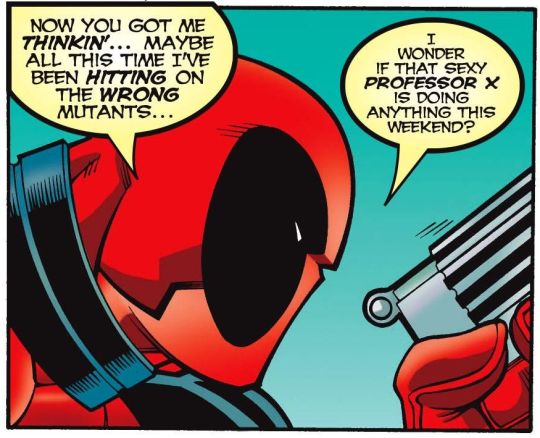
This is the origin of Deadpool as we know him: breaking the fourth wall, making random references, and cementing his motormouth, all while introducing the pieces for almost everything in the first movie. It also has an unexpected amount of depth, introspection, character progression, vulnerability, and long form storytelling. Even, or especially, if you’re not a fan of the character (like me), I’d recommend this run. Bold=Main story Italics=Optional but explained
Deadpool (1997) 1-5
Deadpool -1 (negative one) –Flashback issue. Technically this was published after 6 but it’s a one-shot and this way it’s between arcs.
Deadpool 6-7
Annual Deadpool & Daredevil ‘97 –Both this and the next annual are part of the arcs in the issues preceding them .
Deadpool 8-17
Annual Deadpool & Death ‘98
Deadpool 18-19
Deadpool 0 –Self-contained one shot. I couldn’t find anywhere to fit this so I stuck it here. Can be read any time before 20.
Deadpool 20-33
Baby’s First Deadpool Book #1 –A bunch of random short stories like you’d find in a child’s book. It’s not related to any kind of narrative. It was published around the same time as #22 but can be read whenever.
84 notes
·
View notes
Text
Decoding Inazuma: What is Eternity?
(originally posted May 2023 on hoyolab)
Yoimiya mentions in her second story quest that her ancestor came up with the idea for fireworks as a means to represent the past and the future, but this isn’t a new development in the story: it is precisely the theme that her first quest revolved around and one of the most important concepts in the narrative of the Inazuma chapter.
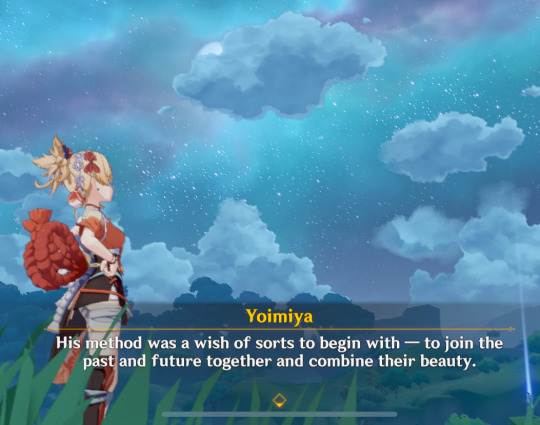
The eternity around transience is the core of Makoto’s ideals, and what Ei comes to terms with at the end of her arc. Thus, Naganohara Fireworks and Yoimiya as a character serve as the first element of insight into the narrative of Inazuma.
The Eternal Connection of Fireworks
In Carassius Auratus act I, we learn that people use fireworks to commemorate special events in their lives, such as the old couple who set them off on the anniversary of their wedding; or to remember old times like the childhood friends who reunited every once in a while to catch up; or to keep promises to each other, like the couple who had been separated when one escaped Inazuma illegally on a boat.
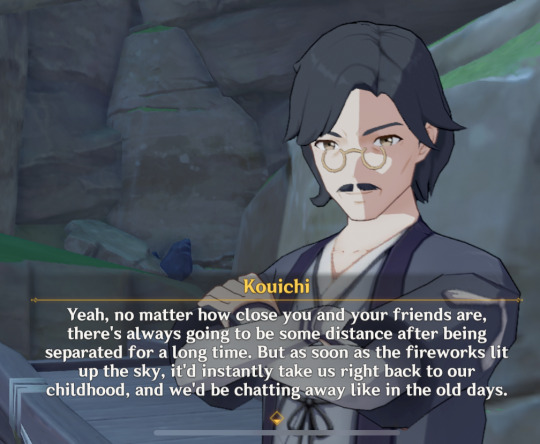
These fireworks were always the same kind, because Naganohara Fireworks gives their customers a special paper slip with their recipe. So no matter how long has passed, as long as they have the paper slip, a member of the Naganohara family of any generation will be able to replicate the exact same firework, and the intentions they were made for from the past can be remembered.
Yoimiya’s character as a whole is used to appreciate the worth and celebrating the transience of human life. She likes to talk to her neighbors more than anything else about their mundane lives, and even works late into the night to provide the fireworks they request. It isn’t precisely people whose lives change the world or belong to the upper class, just regular citizens and their regular joys and sorrows.
Fireworks are used to represent not just the beauty of transience, but also as a symbol of the eternal connection that gives meaning and worth to human life across time. A single person’s life might be a small fragment of history, but ideas —values, culture, purpose, dreams— are passed through each one of them, and they can only endure the passage of time when carried collectively through the generations. This is symbolized through the paper slips provided by Naganohara Fireworks.
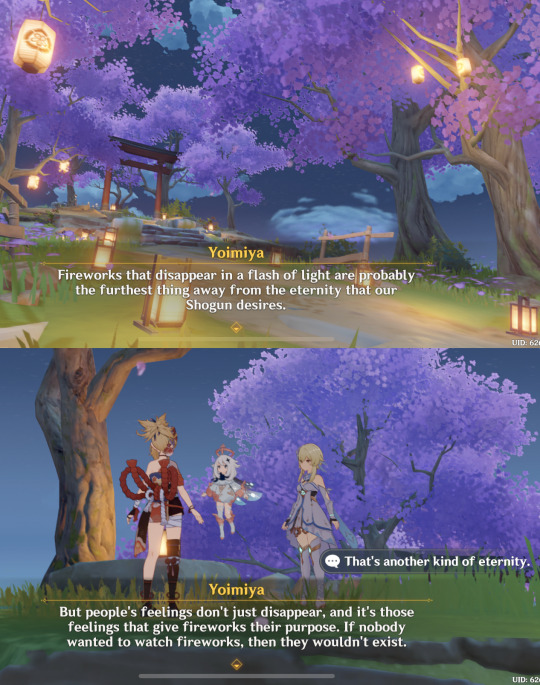
Transience is Part of Eternity
Makoto’s ideal of transience wasn’t a superficial preference for temporary existence. She believed transience was part of eternity, of making insignificant human life part of something bigger, long-lasting, something that could outlive mortality.
This is further emphasized in the climax of the Inazuma archon quest, when Kazuha faces the Raiden Shogun’s Musou no Hitotachi. His friend’s wish was to witness and survive its strike, what the motivations for this ambition are we’re not told, but Kazuha realizes it himself beyond his friend’s death. It is at this moment precisely that the deactivated vision rekindles once more, proving that wishes can survive human mortality as long as they’re carried by the living.
(We can still call it the power of friendship for sentimental reasons, it’s okay)
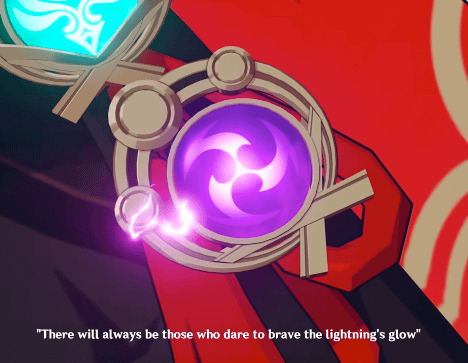
Makoto didn’t place transience above eternity, one is just a means to the other. The twin gods always shared the same goal of eternity for their nation, the difference is Ei was blinded by fear and couldn’t understand her sister’s approach, but they never held opposing views. They both wanted the same for their people: to survive and remain.
But why is eternity so important in Inazuma?
Because Inazuma is based on Japan, and eternity is a fundamental belief in Shinto, the native religion of Japanese people:
Japanese mythology speaks of an eternity of history in the divine edict of Amaterasu. In its view of history, Shintō adheres to the cyclical approach, according to which there is a constant recurrence of historical patterns. Shintō does not have the concept of the “last day”: there is no end of the world or of history. One of the divine edicts of Amaterasu says:
"This Reed-plain-1,500-autumns-fair-rice-ear Land is the region which my descendants shall be lords of. Do thou, my August Grandchild, proceed thither and govern it. Go! and may prosperity attend thy dynasty, and may it, like Heaven and Earth, endure forever."
Modern Shintōists interpret this edict as revealing the eternal development of history as well as the eternity of the dynasty. From the viewpoint of finite individuals, Shintōists also stress naka-ima (“middle present”), which repeatedly appears in the Imperial edicts of the 8th century. According to this point of view, the present moment is the very center in the middle of all conceivable times. In order to participate directly in the eternal development of the world, it is required of Shintōists to live fully each moment of life, making it as worthy as possible.
Similarly, another core aspect of Shinto beliefs is the concept of “Makoto” (yes, like Ei’s sister):
At the core of Shintō are beliefs in the mysterious creating and harmonizing power of kami and in the truthful way or will (makoto) of kami. The nature of kami cannot be fully explained in words, because kami transcends the cognitive faculty of humans.
The kami also reveals makoto to people and guides them to live in accordance with it. In traditional Japanese thought, truth manifests itself in empirical existence and undergoes transformation in infinite varieties in time and space. Makoto is not an abstract ideology. It can be recognized every moment in every individual thing in the encounter between humans and kami.
Kami (Shinto gods) don’t need to be worshiped the way traditional gods do, as performing tasks of regular life is a form of worship in itself, and the truth of kami manifests in it. It seems like a very chill religion.
Shinto doesn’t have a list of ethical rules like conventional religions either, but the concept of Makoto (“truth” or “sincerity”) can be found at the heart of its ethical values. A person who behaves truthfully therefore acts ethically.
This is partly what is meant by the phrase kannagara-no-michi which, in the ethical context, refers to the idea that virtue is inseparable from the rest of life, especially life lived in harmony with the natural world (enlivened by kami). Beauty, truth, goodness, morality - these are all connected, inseparable from each other. Those who live life with the perspective outlined above - with an aesthetic sensitivity, an emotional sensibility toward the world, and with a sincere heart will behave morally almost naturally. List and rules are more important for training animals than for cultivating morality in humans, according to this view.
Having said this, purity rituals are common across Shinto practice, which points to the need for purity in one's heart. This purity of heart is a natural companion to makoto. Often, these activities are done at a shrine, and they symbolize the inner purity necessary for a truly human and spiritual life.
The Grand Narukami Shrine is inspired by these, where Yae Miko performs her duties as the Guuji (chief priestess) that Kitsune Saiguu entrusted to her before passing away.
As a re-interpretation of Shinto within the world building of the game, the beliefs of the kitsune Guuji and Raiden Makoto are not meant to parallel exactly those of the real life religion, but the elements are used to shape up a cohesive narrative in the story.
Yae acknowledges she has more in common with Makoto, as the characters who embody the beliefs and practices of Shinto, and it is her who schemes her way into Ei’s Plane of Euthymia to talk her into finding another path towards this eternity that Makoto wanted.
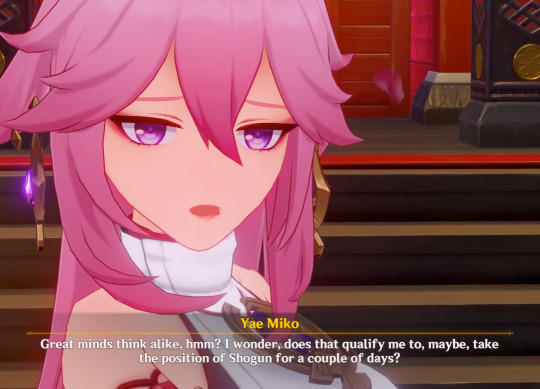
So why does Ei, the archon of the nation, struggle to follow the eternity her sister and Yae Miko understood so well?
From the names in her kit, to her visual motifs, to her lore, Ei’s character is filled with Buddhist references, portraying her with bodhisattva imagery —an entity who has attained enlightenment but has delayed their entry into paradise to help those still suffering in the mortal world. And the original name for the Plane of Euthymia ("Pure Land of One Mind") is a reference to an alternative branch of Mahayana Buddhism that spread to Japan.
Buddhism stands on a completely different set of philosophies to the traditions of Shinto. For instance, one of its main beliefs is that people are trapped in a cycle (samsara) of suffering (dukkha) through multiple reincarnations, and the only way to be released from this illusory world is by following Buddhist doctrines. Life in the mortal world should be ideally finite, it must have an end to cease all suffering, yet Shinto believes in an eternal history that strives to focus on the present moment.
Despite how incompatible they look from the outside, both religions have coexisted in Japan for centuries, and they’re practiced simultaneously by regular people.
From this perspective, it is not odd that Ei would struggle to achieve a goal that is impossible to grasp through the Buddhist lens her character is inspired on.
What we know as “ambition” in the world building of the game (the trigger for obtaining a vision) is originally called “wish” in Chinese text. In Buddhism, there are two types of desire: Tanha and Chanda.
Tanha can be translated as “craving” and it’s a type of desire that on principle causes suffering. If you crave something, this in itself is painful when it cannot be fulfilled; but if it is satisfied, then it is only a matter of time for the good feeling it produces to eventually fade and leave pain behind.
Taṇhā is the key origin of Dukkha. It reflects a mental state of craving. Greater the craving, more is the frustration because the world is always changing and innately unsatisfactory; craving also brings about pain through conflict and quarrels between individuals, which are all a state of Dukkha. It is such taṇhā that leads to rebirth and endless Samsara.
This seems to be the origin of Ei’s need to quell desires (including her own) in order to hinder her people’s progress.
Ei realized early on, in her role of kagemusha and military general, that seeking victory against enemies also brought devastation upon herself and those she and Inazuma cared about. Her sister is who led the nation before she passed away, and Ei’s only contributions as the other half of the archon title were in the battlefield.
Craving for progress, after all, only brings suffering: the fleeting memory of a victory is overshadowed by the losses that follow.
When lightning flashes, it casts a shadow; and her name means shadow. Her existence was defined by this shadow of loss under the victories of progress.
As she herself puts it:
With my blade I purged all obstacles to progress
And yet... Something was lost with each step forward
In the end, I even lost her
I've seen a nation strive forward, and lose everything to the Heavenly Principles
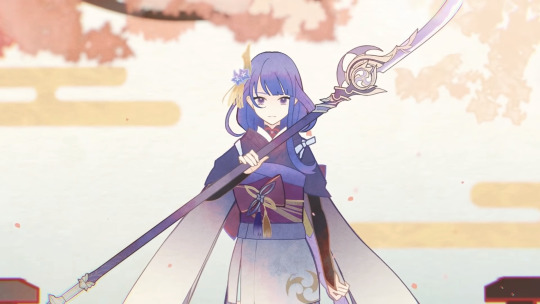
Khaenri’ah was a godless nation, and their demise is understood to be a consequence of their own actions, their own ambition to progress beyond the boundaries of the Heavenly Principles (whatever those are), so of course she grew afraid of what her people might become should they venture in the same direction. And the only way to keep them from meeting the same fate was to ensure her own permanence as a god, hence why she got rid of her physical form to preserve her consciousness in a perpetual meditative state in order to avoid the effects of erosion, and why she made an indestructible puppet that would never leave her nation defenseless.
In the archon quest we see Kujou Takayuki fall prey of his own desires for divine power —that of the Raiden Shogun’s martial prowess that folk tales praise but whose consequences Ei herself feels burdened by— and this is a narrative that repeats over and over again through Teyvat’s history. Watatsumi people, for instance, come from a nation that abused their political positions and manipulated their people through false faith to the artificial sun and the helpless ruling of the Sun Children.
Humans are prone to cause their own demise by indulging in this form of "tanha”, and Ei wanted to protect Inazuma from its dangers.
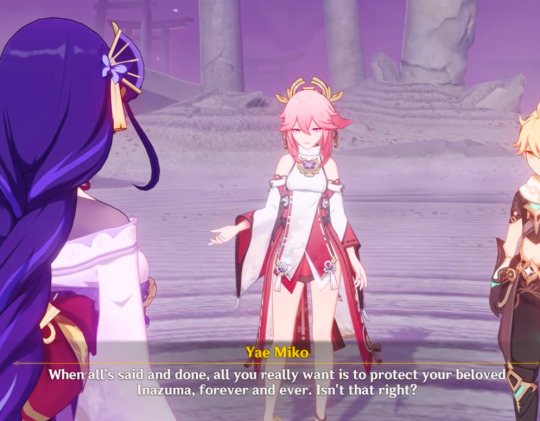
She never had trouble accepting her sister's death, it is because she understood the cycle of life and death so well that she grew fearful of losing what remained: Inazuma. People don't know Makoto existed, so her only legacy and proof of existence is the nation they both raised. As such, Ei vowed to protect it indefinitely by condemning herself to an eternity of stasis inside the Plane of Euthymia.
The Better Path Towards Eternity
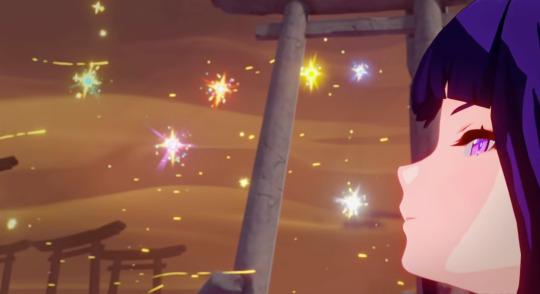
Ei’s commitment to this eternity, this indefinite protection of her nation, never wavered until she met the traveler during the archon quest.
She called him a threat to eternity, therefore, what she saw in our protagonist was a symbol of hope, a faint wish for her nation to progress without succumbing to the Heavenly Principles like Khaenri’ah.
But desires, even in the form of hope, are something she was depriving herself (and her nation) from.
Both times the traveler entered the Plane of Euthymia were right before the Shogun puppet (who is in charge of enforcing this vow to eternity and perpetual sacrifice) struck him with the Musou no Hitotachi, so what saved them was was rather Ei clinging to this hope. Both times she fights this metaphorical hope as well, the first one she wins, and this hope is rejected; and the second (where traveler is aided by Yae Miko) she admits defeat after witnessing the meteor shower of her people's wishes, because she’s accepted the possibility of a future where Inazuma can pursuit their ambitions freely and she doesn’t have to condemn herself to eternal sacrifice.
According to Buddhist beliefs, Tanha (the craving) is the type of desire that causes suffering, but the other form of desire, Chanda, is a path towards salvation:
Sometimes taṇhā is translated as “desire,” but that gives rise to some crucial misinterpretations with reference to the way of Liberation. Some form of desire is essential in order to aspire to, and persist in, cultivating the path out of Dukkha.
Desire as an eagerness to offer, to commit, to apply oneself to meditation, is called Chanda. It’s a psychological “yes,” a choice, not a pathology. In fact, you could summarize Dhamma training as the transformation of taṇhā into Chanda. It’s a process whereby we guide volition, grab and hold on to the steering wheel, and travel with clarity toward our deeper well-being.
So we’re not trying to get rid of desire (which would take another kind of desire, wouldn’t it). Instead, we are trying to transmute it, take it out of the shadow of gratification and need, and use its aspiration and vigor to bring us into light and clarity.
Makoto believed that eternity could be achieved by guiding the collective dreams of her nation into the right path, what matters is not physical survival or individual desires, but the collective force pushing for progress. And, in this sense, dreams could be understood as its own type of Chanda (within the narrative of the chapter, not the world building) that Ei came to terms with in her second story quest.
The losses Inazuma suffered —the shadow— are not meant to be grieved, but honored. They were all sacrifices intended for the survival and protection of the nation and its ideals and dreams, such as that of the soldiers who fought during the cataclysm, that of Kitsune Saiguu or the Tengu General, and that of Makoto as well.
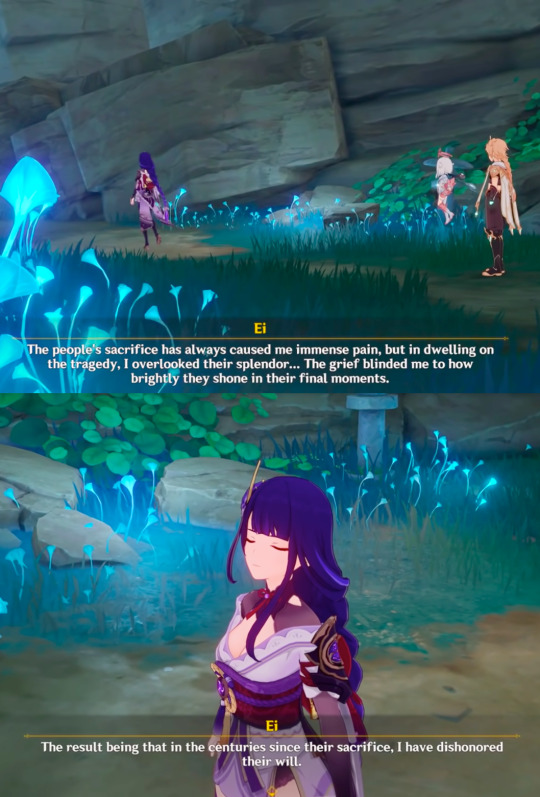
Kazuha and his friend can be interpreted as an alternative exploration of this theme: Kazuha grieved his death and failed to understand the motivations behind his actions, but when he faces the Musou No Hitotachi himself he's able to comprehend and carry his friend's wishes as his own. After this, he is at peace and able to move on.
After all, life is akin to a firework that only lasts a couple of seconds, but what they symbolize and the ideas they preserve are what matters. This is the eternity of the nation of thunder.
Whenever I think about the Inazuma chapter, I'm always reminded of this anecdote about the Gold Pavilion Temple that, in a way, summarizes what Makoto believed:
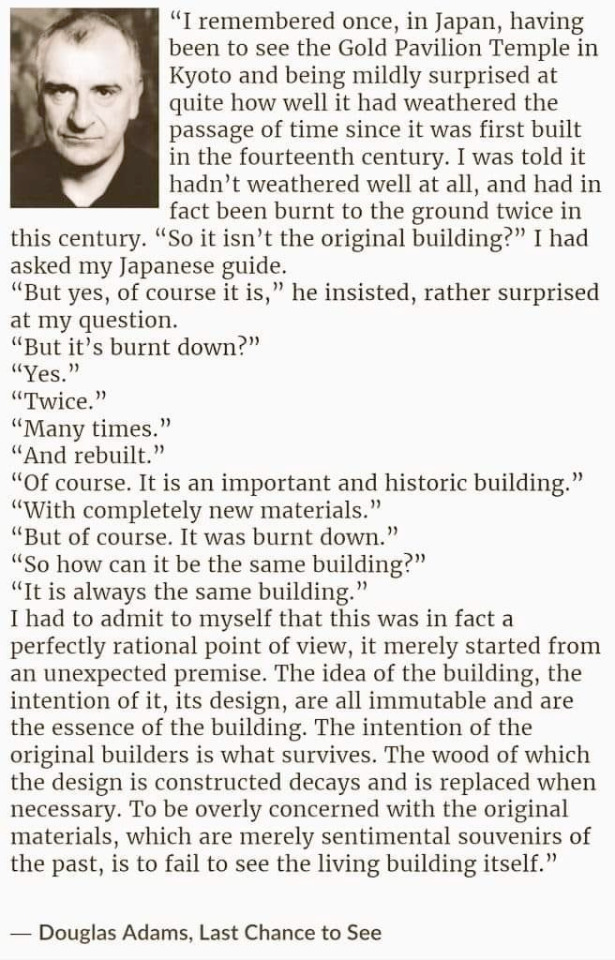
9 notes
·
View notes
Text
Decoding Inazuma
This is an ongoing series where I explore the many layers of narratives and themes present in this chapter. Heavy interpretation is involved, but the core arguments are supported by cultural references and historical parallels with Japan, the inspiration behind the nation.
Part 1: What is Eternity?
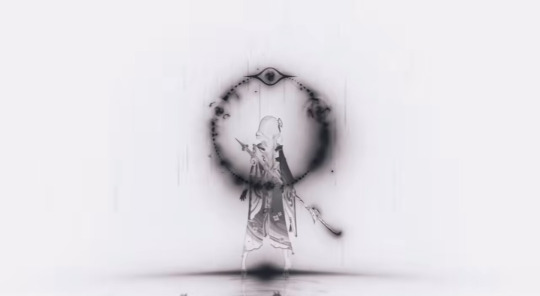
About Ei's struggles to follow the path of eternity, a fundamental belief of Shinto (the indigenous religion of Japan), through the lens of Buddhist philosophy. Both religions have co-existed in the country for centuries, practiced simultaneously by regular people despite their opposing and contradicting world views.
Makoto’s ideal of transience wasn’t a superficial preference for temporary existence. She believed transience was part of eternity, of making insignificant human life part of something bigger, long-lasting, something that could outlive mortality. She didn’t place transience above eternity, one is just a means to the other. The twin gods always shared the same goal of eternity for their nation, the difference is Ei was blinded by fear and couldn’t understand her sister’s approach, but they never held opposing views. They both wanted the same for their people: to survive and remain.
Read Part 1: What is Eternity? on hoyolab
Part 2: The Allegory of the Puppet Ruler
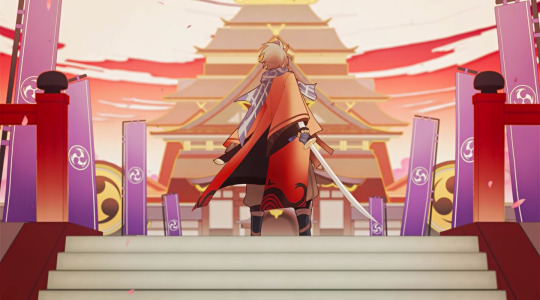
An analysis between the parallels of Tokugawa Shogunate Japan's class system and the natural order of Teyvat's own Heavenly Principles, explored through the narrative of Ei's arc of duty and sacrifice.
Defiance to absolute power or order is the path towards liberation that ultimately breaks down Ei's fear of the Heavenly Principles, and allows her to hope for a better future.
While the Shogun puppet represents absolute order and the figure of the Almighty Raiden Shogun represents ultimate power, Ei simultaneously plays the role of both the samurai trapped in her obligation to duty and the major authority of the nation. It's almost like she herself is part of the social order, she's the one upholding this system because she believes it is her duty to do so, and she can't conceive taking a different path because she's afraid of the Heavenly Principles, the actual universal order of Teyvat. The Heavenly Principles are at the top of the hierarchy, and everyone else (including Ei) owed absolute obedience and submission to it.
Read Part 2: The Allegory of the Puppet Ruler on hoyolab
24 notes
·
View notes
Text
my anaxa satanism essay was marked and i got an a+!!!! so here it is without doxxing myself
note: this was written during 3.1
the page citations for the non-wiki sources are inaccurate because they come from a compiled pack made by my professor but you should still be able to look them up if you want anyways
link to the original reblog where i first talked about this as like an intro before the essay if you want
14 notes
·
View notes
Text
mydei is a reference to alexander the great. holy shit.
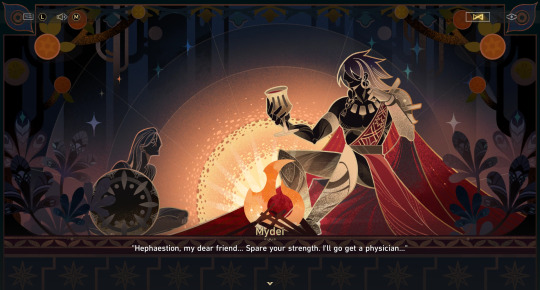

putting context below the cut for those curious:
alrigth so,
hephaestion was alexander the great's 'closest friend' (read: super gay homosexual boyfriend) who died and was given an outrageously extravagant funeral. alexander also had the physician who failed to save hephaestion executed.
the 'to the strongest'-line is a reference to alexander's alleged last words before he died, in response to being asked who should inherit his kingdom.
44 notes
·
View notes
Text
How Sunday is Perfectly Morally Gray
Original thread on Twitter
Sunday is a misguided savior—made to believe he is the sole salvation of all, who was willing to be the lonely scapegoat/sacrifice/host of a place where everyone else but him lives in a beautiful never-ending dream.
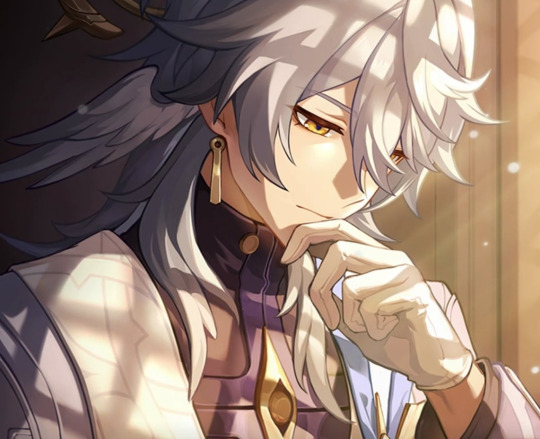
Repeatedly during 2.2, Sunday alludes to a story about the Charmony Dove and how he believes an injured bird who can't fly should be caged, pampered and fed to live the rest of its days in comfort. It is alive, that is what matters the *most*
Sunday's thoughts to me probably go—Why can't we be all caged like the Charmony Dove? Where is the place that we can exist without predators and hardships? Everything should always be nice and unchallenging, we should just leave in perpetual peace and happiness and indulgence
This idea of a paradise free of suffering is reflected in the "sweet dream" of Penacony, but Penacony itself is fueled and fed by its dreamers who slowly lose themselves as the dream eats away at them.
So Penacony can't be the paradise, there needs to be a better, a newer dream that someone will bring forth so that everyone can be the Charmony Dove in the cage. No more hardships, no more sadness, no more disease, no more death, everyone lives their best lives.
Sunday was brainwashed into thinking HE would best suit as a sacrifice to these needs, he was ready to be the lonely host of this new and so much better dream where everything is all good. He designated himself as the cage, he is the sacrifice so that everyone else can have it good.
Everything about this heavily references an old short story by Ursula Le Guin called "Those who walk away from Omelas" which is basically a story about a wonderful utopia called Omelas where everything great and stuff, BUT it comes with the price of one single child suffering very badly
The story details how most people are horrified to learn about this child who lives in total abject misery, darkness and filth, but they see the utopia they live in and go "this is fine, this beautiful paradise is all worth the suffering of one person"
But SOME people can't deal, even just one person suffering and not being part of utopia is a no go, it's not worth it, so they "walk away from Omelas" and go somewhere not better objectively, but just away from that place and that price they had to pay for utopia
Sunday literally wants/offers himself up to be this child. He is willing to be the sacrifice so that everyone else can live happily. Because, selfish as it is, he feels like everyone should be put in a gilded cage so they can have it good and easy.
There's a very misguided savior complex here where he thinks everyone should be subject to this sort of "salvation" like there's a special mindset here of Sunday's, self-sacrificing and very Catholic that HE can choose what is good for others and be willing to pay the price for it
And like, it's terrible but also commendable at the same time. Sunday says if you are weak that is fine, he will give you a dream where you can just live your """best life""" and be ""happy"" but is it really happiness if it's "fake"/handed to you on a platter and decided for you
But the message of Penacony says dreams are just dreams and you should wake up and strive for it, not live in the dreams. Omelas says if even just one person has to pay for your paradise it will never be worth it.
Sunday is terribly misguided, was brainwashed/conditioned to believe this, using his childhood grief to perpetuate a misguided ideology where he will basically Jesus himself for a thing that is objectively not really any good for anyone.
But like, he is rather straightforward as a character and yet his motivations and what thoughts he might have while believing in this is so so fascinating…
Anyway I stop yapping maybe don't hate Sunday, maybe read Omelas
PS: Does Sunday think he is unworthy of his own paradise because he failed to save his mom if so that's so Catholic of him dude needs therapy
193 notes
·
View notes
Text
Eternal Punishment: Ideology, Performance, and Martyrdom as Sunday's Expressions of the Death Drive
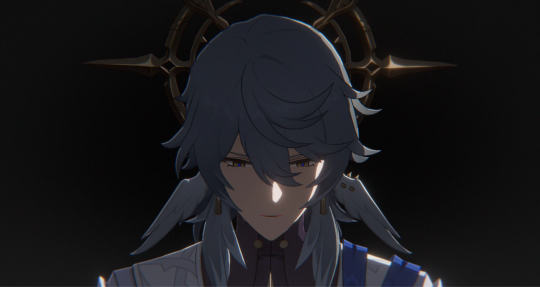
“Sleep sleep happy child. All creation slept and smil’d. Sleep sleep, happy sleep, While o’er thee thy mother weep” -William Blake, “A Cradle Song,” Songs of Innocence and of Experience “So, where is my dream?” “It is a continuation of reality.” “But where is my reality?” “It is at the end of your dream.” -The End of Evangelion (1997)
Considering the majority of his development occurred in Penacony’s third act, Sunday has proven himself as a compelling antagonist who rivals both Takuto Maruki (Persona 5 Royal) and Kevin Kaslana (Honkai Impact 3rd) in grandiosity and pessimism. Although his motivations and methods closely resemble theirs, the tragic path that led Sunday to his rigid belief system began when he was still a child and is intimately related to his experience with family. Having both witnessed the suffering of others and experienced it himself, Sunday’s ideology was born with a single purpose: to shelter humanity from the pain of reality. His answer to life appears rational on its surface and is constructed with kind intentions, but in practice it would have damned the cosmos to a purgatorial world of constancy and doomed its creator to infinite loneliness. It is this tension between Sunday’s intentions and the truth of his actions that fascinates me, because it reveals a deeper conflict within him that is also at the center of Penacony’s story. Here, I’ll use some of Freud’s psychoanalytic theories to illustrate what exactly that conflict is, and why it’s so important for a full understanding of both Penacony's finale and Sunday’s arc thus far.
Cohesion not guaranteed, my brain feels like swiss cheese after 2.2
Spoilers for the entire 2.2 Trailblaze Mission (In Our Time) and a small post-quest with Robin (The Feather He Dropped).
Disclaimer: All content in this post, especially the psychoanalysis, should be taken in the spirit of media analysis and nothing more. Also, corrections and additions are welcome, whether they are about interpreting Freud or HSR. :)
To cut down on post length, external sources (that is, any reading that is not official Star Rail material) are given as numbered in-text citations and gathered in a pastebin document linked at the bottom with the full title and exact page numbers of the source.
And before we begin, a huge thank you to my boyfriend for proofreading this numerous times despite not having played any Hoyoverse games, and for talking out the philosophy with me T_T That’s love right there!
Penacony, Freud, and the Occasion for the Death Drive


“The IPC does not care about its workers! I bet you they would love it if those monsters came and killed me. That way they wouldn’t have to pay for my pension!” “Sounds like somebody could use a Sprinkles cupcake!” -It’s Always Night in Penacony Show
It is impossible to avoid Sigmund Freud when discussing the psychology of dreams, and his psychoanalytic theories are tightly woven into nearly every aspect of Penacony’s environment and story. Our most salient point of entry into his work is The Family’s sweet dream, which embodies the base instinct in human nature towards pleasure-seeking behavior and instant gratification, even at the expense of self-preservation, also known as the pleasure principle.¹ Be it slot machines, luxury cars, decadent food, or endless shopping malls, everything in the sweet dream exists to further each guest’s pursuit of pleasure—such is the purpose of dreams, Freud theorized, as vehicles for wish-fulfillment.² “Death,” let alone pain, is not allowed to exist in the sweet dream in order to preserve that pleasure:
“A further incentive to a disengagement of the ego from the general mass of sensations–that is, to the recognition of an ‘outside’, an external world–is provided by the frequent, manifold and unavoidable sensations of pain and unpleasure the removal of which is enjoined by the pleasure principle, in the exercise of its unrestricted domination. A tendency arises to separate from the ego everything that can become a source of such unpleasure, to throw it outside and to create a pure pleasure-ego which is confronted by a strange and threatening ‘outside’” (Freud, 1930, p. 4).³ “One of the twelve Dreamscapes in Penacony, and its time coincides with midnight. Here, the dream's time is forever stuck at 00:00. Tomorrow will not come, and this night of revelry will never end” (Loading Screen: Golden Hour). Gallagher: …Think about this — what would it cost to create and maintain such a lavish dreamland? Gallagher: It's people's lives. The opulent dream is built upon the decay of spirits, with a toxic elixir called "pleasure" flowing through the Dreamscape. It tempts people to indulge in the Dreamscape, and gradually their minds succumb, becoming nourishment for the sweet dream. (The Public Enemy)
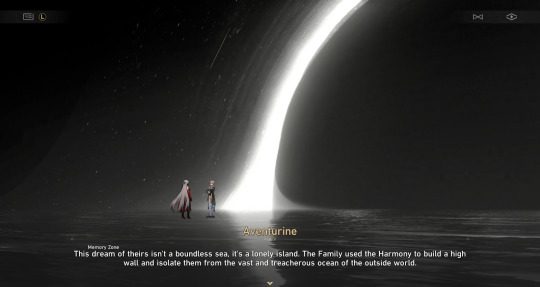
Aventurine: This dream [Memory Zone] of theirs isn’t a boundless sea, it’s a lonely island. The Family used the Harmony to build a high wall and isolate them from the vast and treacherous ocean of the outside world.
But “death” still lurks beneath the juvenile fantasy and its sweet commercial lies, in the yawning chasm proceeding spiritual death. This space, the Primordial Dreamscape, is a chaotic rendering of memories and emotions that goes beyond consumerism as the ultimate form of pleasure, and the high walls of the sweet dream separate each “Moment” from its depths. It is the original form of the sweet dream, its primitive reflection in the Memory Zone’s water, and the crystalline bodies of its memetic entities are like mirrors into the past inviting guests’ introspection.
Introspection is the Achilles’ heel of The Family’s superficial paradise, because curiosity about oneself redirects the ego’s interest from external objects to the inner abyss of thoughts and desires deemed unacceptable in reality, and remembering their existence reveals psychic pain. The Family’s denial of these ‘impure’ thoughts reflects the process by which the ego represses instinctual impulses to avoid that pain:
Robin: While I was away from Penacony, the boundaries of the Twelve Dreamscapes kept expanding outward. But whenever I mentioned the anomalies in my dreams... all The Family heads refused to talk about it. Only my brother was willing to respond... Robin: Later, I discovered the secret letters from the IPC ambassador, which further convinced me that there are hidden secrets beneath the surface of Penacony. So, following the clues in the Oak Family's dossiers, I found my way here... Robin: ...The land of the exiles, concealed by The Family under the guise of "Death", a dream within a dream where Penacony's past is buried. (Small Town Grotesque) “Life is parceled in impenetrable barriers, obstructing the intrusion of the alien. But beneath that ironclad shell, there is a region both nameless and fragile” (Memory Zone Meme “Heartbreaker” Story). “We are very apt to think of the ego as powerless against the id; but when it is opposed to an instinctual process in the id it has only to give a 'signal of unpleasure’ in order to attain its object with the aid of that almost omnipotent institution, the pleasure principle” (Freud, 1926, p. 92).⁴
Freud begins Beyond the Pleasure Principle (1920) by pointing out the foundational assumption of psychoanalysis, namely that all psychic processes serve the pleasure principle in infantile life and the reality principle at a later point of ego development. The reality principle arises from the ego’s instinct for self-preservation, and it redirects pleasure-seeking behavior so that one is willing to wait for its payoff. Rather than relying on dangerous sources of pleasure that provide instant gratification, instead the constraints of reality (or “time”) imposed on the ego and any consequent pain (or “tension”) are endured for the sake of eventual pleasure.⁵ For psychoanalysts, this only further cemented pleasure’s importance in mental life.
However, as World War I came to an end, Freud found these principles alone were insufficient to explain the purpose of trauma dreams in veterans returning from the battle front. Their dreams would faithfully recreate traumatic memories from the war each night, with no pleasurable payoff for the dreamer, and this directly contradicted Freud’s theory of dream interpretation.⁶ If trauma dreams did not fulfill the dreamer’s unconscious wishes, then they did not follow the pleasure principle; they seemed to serve some other purpose.
Though unconsciously repeating pain in waking life was not a new idea in psychoanalysis, trauma dreams highlighted a critical flaw in its understanding of this behavior’s ends. To untangle this complexity, Freud reexamined the aims of the “compulsion to repeat,” and speculated that it is not only an instinctual behavior, but also has an earlier origin than the pleasure principle. He then proposed a dualistic theory of desire that revealed something he believed was common to all organic life—that if there are life instincts, or what he called “Eros,” that are geared towards an organism’s pleasure and self-preservation, then there is also a primary death drive, or death instincts, that aims for its destruction:
Acheron: The Beautiful Dream is crumbling, but not because of a particular Aeon, a particular faction, or a particular visitor. Its collapse stems from a certain inevitability of human nature. The Family refuses to acknowledge this, and it has ultimately backfired and become a catalyst… Acheron: As people immerse themselves in the Dreamscape, where consequences and pain cease to exist, and only ease and pleasure prevail, they draw closer and closer to necrosis. Regardless of the perceived bliss, death looms as the inevitable conclusion. Acheron: Also, this necrosis will diffuse and spread. One piece of the puzzle’s mutation will eventually cause the entire building to shake, break…and crumble. Welt: …In the end, the dreams that people built in the name of freedom became the cage that imprisoned them. (When the Sacred Ginmill Closes)
The “inevitability” Acheron refers to is one and the same with the death instincts as illustrated through the Nirvana principle, originally proposed by psychoanalyst Barbara Low and adopted by Freud in Beyond the Pleasure Principle. Early on in the work, he identifies G. Th. Fechner’s principle towards stability, or the constancy principle, as a greater implication of the pleasure principle’s terms. According to this principle, the psychic apparatus (or ‘psychic processes’) aims not only to relax psychic tension to avoid pain, but also to keep tension low and constant.⁷ But this raises a problem: the pleasure principle’s express purpose is to avoid pain, but pleasure is a finite state that can only be felt as such if there is pain to reduce in the first place. If this balance is interfered with, we do not preserve the initial euphoria of pleasure infinitely, but instead find it dulled with time until it approaches ‘zero’:
“When any situation that is desired by the pleasure principle is prolonged, it only produces a feeling of mild contentment. We are so made that we can derive intense enjoyment only from a contrast and very little from a state of things” (Freud, 1930, p. 16).⁸
This ‘zero’-state is the aim of the Nirvana principle, where it is not just the reduction of excitation but rather its total elimination that is ultimately desired.⁹ In other words, its aim is stillness through the suspension of psychic processes, a state of being that could only find its analogue in dormancy,¹⁰ or something unto death. Acheron’s point is that this necrotic, empty feeling is not an accident, because “death” lays the foundation for something new.
And this, at last, brings us back to Sunday. Incongruence, fantasy, and wishful thinking are just some of what drives Sunday to create his ideal world, a paradise where every day is a day of rest. Though his methods are misguided and extreme, he does this out of compassion for the weak and a sense that he must catch them in his paradise before they crash to their death. In truth, this “paradise” was death in a different form, where reality is inverted with one’s personal fiction and conflict is transcended by removing choice. The conflict between the life instincts and death instincts is key to understanding how Sunday arrived at this answer to life’s pain, but to understand the depth of that conflict we must go beyond his facade and grasp the true meaning of his infantile fantasy. By employing a Freudian psychoanalytic reading of Sunday’s arc, I hope to open new avenues of discussion about both his character and the meaning of Penacony.
The Prison of Fate


“Is darkness equal to daylight? Are sinners equal to the righteous? If you are born weak, which god should you turn to for solace?” -Sunday, Everything that Rises Must Converge “You know, in the thick of things, people are blind to the grit in their eyes...yet they can always feel its scratch. Want the answer? I'll give it to you. The whole thing is just fate playing a cruel joke on us.” -Gallagher, A Walk Among the Tombstones
We’ll begin with Sunday’s warped understanding of society and his ideology, as these represent the first layer of his fantasy. What’s striking about Sunday’s reading of human nature is his pessimistic outlook on human relationships and the potential for individuals to change. Sunday believes that life obeys a natural law called “survival of the fittest,” a perverse interpretation of Darwinian principles of evolution, that categorizes individuals as “strong” or “weak” based on inherent, unchangeable qualities within them. This law is the foundation of a chaotic world where the strong do not defend the weak, but trample them for their own gain:
Sunday: While the Harmony holds noble aspirations, the strong will always be strong, and the weak will always be weak, even in this carefree dream... Human nature contains greatness, but it also harbors inherent weaknesses that can't be eradicated. Sunday: In the end, if people can't even secure their own survival, they won't care about the illusory future of equality. As long as the law of survival of the fittest prevails... there will always be fledglings crashing to their death. (The Only Path to Tomorrow)
Sunday’s ideology takes a page from Arthur Schopenhauer’s The World as Will and Idea, where he argues that the will to life is the reason individuals suffer, because, like the pleasure principle, “the basis of all willing is need, deficiency - in short, pain.”¹¹ Willing is a feature of individuality, which Schopenhauer further identifies as an illusion of nature—that is, individuality obscures how all life is an expression of one underlying Will, the common source of life.¹² In Sunday’s ideology, Schopenhauer’s “individuality” and “willing” are substituted by the term “self-value,” which forms the basis of the illusory prison of human consciousness. Self-value, then, is the root of human suffering, because satisfying the will to life requires taking “value” from others:
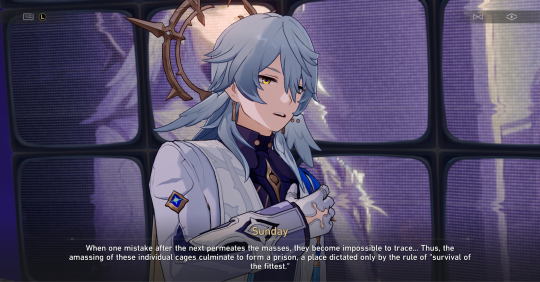
Robin: That's just sophistry. If that were true, then only the powerful would have the right to determine the future. Sunday: Unfortunately, that's exactly what happens. Another name for "the future" is "self-value." [...] Sunday: Some are born weak and vulnerable, some find themselves trapped in unfortunate circumstances, some fall victim to malice and cowardice. When it comes to survival, everyone is equal, and the weak can only watch as their value [future] gets constantly diminished by external forces. (The Only Path to Tomorrow) Firefly: So, what is your definition of living a happy life? Sunday: Good question. Human consciousness is fundamentally an illusion, a cage known as "self-worth". People lured in by this illusion, make mistakes, yet still ask that external influences bear the burden. Sunday: When one mistake after the next permeates the masses, they become impossible to trace... Thus, the amassing of these individual cages culminate to form a prison, a place dictated only by the rule of "survival of the fittest." Sunday: Nature is always accompanied by predation and sacrifice... Its antithesis is known as Order. (Beauty and Destruction)
As long as the will to life must be satisfied, “survival of the fittest” will persist; in other words, the illusion of self-value ensures the law’s survival in the future. While this tells us part of why Sunday equates self-value with the future, his statement can also be interpreted through a psychoanalytic lens, particularly as it relates to transference and the repetition compulsion. Transference is the process by which people unconsciously cast the roles of past figures onto current relationships, repeating past trauma in the present. The individuals filling the roles may change, but the roles themselves remain constant through time. Through transference, a person’s unresolved past and unconscious beliefs adopted from those experiences construct an illusion that passes for objective reality:
"What psycho-analysis reveals in the transference phenomena of neurotics can also be observed in the lives of some normal people. The impression they give is of being pursued by a malignant fate or possessed by some 'daemonic' power; but psycho- analysis has always taken the view that their fate is for the most part arranged by themselves and determined by early infantile influences" (Freud, 1920, p. 15).¹³
Transference is driven by an underlying compulsion to repeat the past known as the repetition compulsion. In Beyond the Pleasure Principle, Freud found that the repetition compulsion does not solely operate in service of the pleasure principle as it was previously understood, but also as an unconscious compulsion to repeat pain. Psychoanalyst and scholar Jonathan Lear provides an example of this in Freud (2015) when he describes the nature of unconscious mental processes:
“Suppose, to take a highly simplified case, a child has an unconscious fantasy, ‘I am the unloved one.’ Precisely because this fantasy is exempt from contradiction and is presented in a timeless mode, the person will tend to interpret life’s passing events through a frame of feeling unloved. The person will focus on real-life slights; but even kind gestures will tend to be treated with suspicion, as though there must be some underlying motive (‘He was nice to me only because he wants something from me’). The world will come to seem an unloving place, thus reinforcing the fantasy. The person can come to feel that she is somehow fated to be unloved.” (Lear, 2015, p. 6).¹⁴
To put Lear’s example in Sunday’s terms, an unconscious fantasy adopted from past experiences is the underlying material that constructs the illusory prison of self-value. The prison shapes our perception of reality, and this perception then reinforces the prison’s ‘form’ by affirming the unconscious fantasy. If one’s perception or the fantasy were to change, the dimensions of the prison would change with them, reshaping ‘reality.’
The prison of self-value therefore ensures the past’s survival in the present by facilitating its repetition; through repetition, the past becomes the prisoner’s future. In other words, by materializing the unconscious fantasy in reality through actions, the prison of self-value becomes one’s fate. We can then apply this framework to Sunday’s ideology: if fantasy and perception co-construct one another to create an individual human consciousness, it follows that Sunday’s ideology, as a reflection of his perception of the world, is rooted in an unconscious fantasy too, a belief that he has about himself.

Sunday: Well, don’t forget this…. not everyone really has a future.
So, just what is that belief? The past holds great significance to Sunday, and he vividly remembers the consequences of each decision he made. While in his inner world, he recounts three decisions that led him to lose faith in the Harmony and choose the Order for salvation. These decisions involved a Charmony Dove he and Robin found as children, a fraudulent stowaway, and Robin’s brush with death while she traveled beyond Penacony. He then asks which choice the Trailblazer would make given each scenario—the same choice as Sunday did, or some other choice? However, the choices are limited to either-or decisions between Sunday’s choice and its extreme opposite: either support Robin’s journey, or prevent her from taking it; either remain silent, or ask the Bloodhounds for mercy; either cage the Charmony Dove, or build a nest for it in a yard of predators, and no matter the choice, it always ends in tragedy.

Sunday: I know the suffering of being tormented, the turmoil of losing your way, how sorrow… and even despair, set in when matters don’t work out. All of this causes me unending pain, because this is not what “happiness” is at all.
This is because Sunday understands the world in terms of dichotomies, where things are either good or bad, righteous or sinful, strong or weak. It’s also why Sunday’s choice in each scenario is cast as the “good” choice, because it was made with kind intentions, while its opposite is the “bad” choice because it lacks compassion for the individual. The unfortunate outcome of either decision, both real and imagined, is therefore meant to persuade the player that Sunday’s perspective is ultimately correct, because “good” choices do not necessarily result in “good” outcomes in a disorderly world. Rather, choice itself is a chaotic variable that introduces uncertainty, splitting life into infinite paths and possibilities, or “untraceable mistakes.” In order to control outcomes, choice must be removed, even if such an outcome can only be achieved through fantasy.
To see the world in this way is to inhabit the monochrome world Acheron first referred to in Act I, a world where it’s all or nothing, and everything appears black or white. This manner of thinking constructs each decision as a false dilemma, which artificially limits the available options or perspectives to two extremes. For our purposes, this is among the most meaningful hints as to what Sunday’s unconscious fantasy is, because it is born out of his intense need for control, which is both a defense against the fantasy and the primary way that he repeats it.
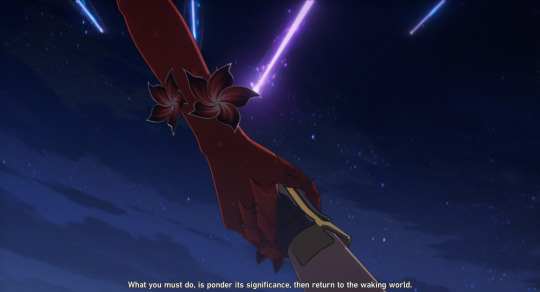
Acheron: The golden dream is getting restless. In the coming long night, I'm afraid you will face many tribulations and witness many tragedies. And finally...your sight will only see black and white. Acheron: But please believe me that in that monochrome world, there will be a glimpse of fleeting red, and when you make a choice, it will reappear before you once more… (The Knocking at Ungodly Hours)
With this in mind, we can use Sunday’s black and white thinking to our advantage. Upon closer observation, a common theme is repeating itself in each decision Sunday did make, with each individual cast in the same role at different points in time. Despite his best intentions, Sunday’s actions alone can’t protect them from tragic outcomes—indeed, he is powerless against their fate. According to his ideology, there are inherently strong individuals and inherently weak individuals, and the strong have the power to defend the weak, but often choose not to; by this same logic, if Sunday can’t defend the weak despite his intentions to do so, then he must not be strong. He must be weak.
This brings us to the Charmony Dove’s fate, which is undoubtedly the most significant to his character out of the three scenarios, and acts as a symbol of the difference between Sunday’s and Robin’s beliefs regarding humanity. The bird is an object that they project these beliefs onto, shaped by their individual “cages,” and its fate reflects those beliefs back at them, reinforcing their diverging fantasies:
Sunday: This place is too dangerous for a fledgling. Let's take it with us — we can put it on the wooden shelf in front of your window. Robin: Okay! A bird like that must have a beautiful singing voice. But where will it live? Sunday: I'll ask the family head to build a cage for it. Robin: A cage... but then it won't have the freedom to fly, right? [...] Robin: Even if it's small and not fully feathered, and can't sing... it didn't come into this world just to be locked up in a cage. Robin: Birds... belong to the sky. (The Only Path to Tomorrow)
To Robin, the Charmony Dove is full of potential, and its fate can’t be determined by a single moment of its life, but Sunday regards it with caution and uncertainty; one wrong move, and the bird will take its last breath. This difference becomes the central disagreement in their debate over the sweet dream’s value, and Sunday reveals the bird’s tragic fate to Robin in order to drive home his point:
Sunday: Shortly after you left, it crashed to its death right in front of your window. Robin: ...I had surmised as much. I knew you wouldn't have avoided mentioning the bird for no reason. Robin: Despite that unfortunate outcome, I still believe it was the right decision. Birds aren't meant to spend their lives in cages... They belong in the sky, even if they can't fly. Sunday: But here's the thing. If there are birds in this world that can never fly, can we really assert that they belong in the sky?
Sunday’s meaning is clear: flightless birds are no different from those individuals who are born weak, and their fate is to watch their future disappear under the pressure of external influences. While Robin came to embody her beliefs by leaving Penacony behind, Sunday stayed and rose through the Oak Family’s ranks, never leaving the sweet dream’s cage. He embodies his beliefs by denying himself a future, because to choose otherwise would contradict his fantasy—that he is a flightless bird too, and therefore has no “value”:

[Sunday]: The victor bears the responsibility of victory. Finish me... and fly into the sky. [Robin]: We were supposed... to fly into the sky together. [Sunday]: ... [Sunday]: If only... I could… (The Feather He Dropped)
Sunday's unconscious fantasy—that he is an inherently weak person, a bird that will never fly—is a reflection of his self-value. By unconsciously repeating the pain of his past, his fantasy becomes the illusory prison known as one’s future, a self-fulfilling fate.
But all of this is only a small piece of the puzzle. It tells us what the unconscious fantasy is and how it affects him, but it doesn’t really tell us why he has it in the first place. Just as the belief was hidden in the shadows of Sunday’s ideology, its origin is hiding behind something even more conspicuous—a grand performance on the dreamscape’s finest stage.
An Infantile Drama
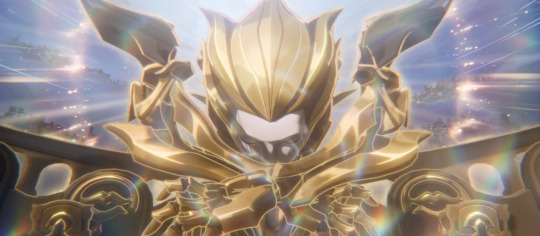
Trailblazer: Where is the Stellaron? Why am I not seeing it? Sunday: It hides behind the curtain. Or rather, it is the theater itself. (Everything that Rises Must Converge)
Naturally, this leads us to the Embryo of Philosophy.
There is so much to talk about between the three phases of this entire fight, not to mention the mountains of references it makes to other media. However, I want to train our attention on the Embryo’s tears. Why is it crying, and why at this particular moment? The religious meaning of its tears is clear, but what is their psychoanalytic significance?
First, let’s consider their context. The Embryo’s golden tears stream down its face with each turn of “Im Anfang war das Wort” (“in the beginning was the word”), stretching its arms towards the sky with palms open in worship of Order. On the 8th turn, it reaches toward the sky to ask for Ena's blessing; Ena answers its call, reaching down to grant it power, nearly touching the Embryo’s outstretched pointer finger with THEIR own. In doing so, they create a mirror image of Michelangelo's The Creation of Adam, a depiction of God giving Adam the spark of life.
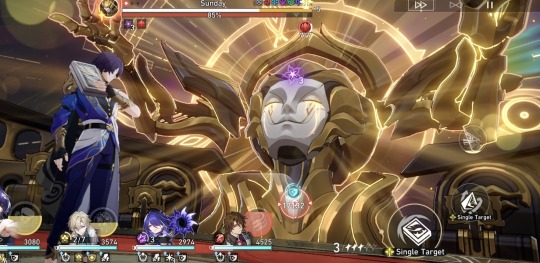

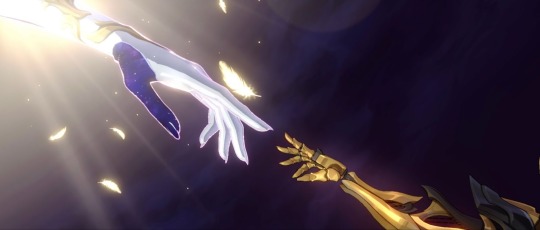
This artistic and religious reference, alongside the Embryo’s fetal imagery and tears, leaves no doubt that the third phase in the fight is Sunday’s “moment of birth” as an Aeon, and this suggests that birth must inform the answer to our original question. So then, why does the Embryo’s “birth” bring it to tears? The answer lies in the meaning of Sunday’s performance in Penacony Grand Theater, of which the Embryo is just one part, and how it relates to his unconscious fantasy.
In a final effort to dissuade the Astral Express from resisting his plan, Sunday stages a dramatic retelling of the Order’s Genesis story and Penacony’s history that chronicles its changing masters through the eras. As an immersive stage play, its completion hinges on the crew’s participation, which involves slaying the master at each act’s conclusion in order to usher in the next one. Through his play, Sunday argues that humans crave a master who can provide them with meaning in the face of chaos, and because of this inherent weakness, progress is an illusion. The past, present, and eternal show of human history is one of endless repetition and self-delusion – though the individual master may change, humans remain puppets by their own design.

The Past, Present, and Eternal Show
This fraught relationship between humanity and its masters was a foundational point of Freud’s theory of the death instincts, which he grounded in his observations of infantile play. While he was staying with his daughter’s family, Freud noticed a peculiar game his grandson played with his toys that further called the pleasure principle’s dominance into question. The game began when his grandson threw the toys out of sight to make them “disappear,” after which he would retrieve them with his mother’s help to make them “return.” Freud deduced that this game (Fort/Da) was a reenactment of his mother “disappearing” when she left him at home, and speculated that it played a crucial role in his grandson’s good behavior during her absences.¹⁵ If the game was in service of the pleasure principle, Freud expected that the entire game would be played to completion, where the pain of the toys’ disappearance is endured for the eventual pleasure of their return. Instead, his grandson often only repeated the disappearance – the “drama’s” most painful part.¹⁶
In infantile play, several instincts intersect with a child’s memory in order to process psychological stimuli.¹⁷ Repetition facilitates their sense of mastery over unfamiliar stimuli, whether pleasurable or painful,¹⁸ and play offers a safe, fictional space for children to make sense of reality, where they can leave behind their role as spectators of life’s phenomena and become actors on its stage.¹⁹ By playing an active part in a memory’s repetition through play, indeed by controlling it, children move toward an even grander wish in their hearts: “the wish to be grown-up and to be able to do what grown-up people do.”²⁰ Freud suspected this was why his grandson played the game, because it offered him a sense of agency over his mother’s absences that reality could not.
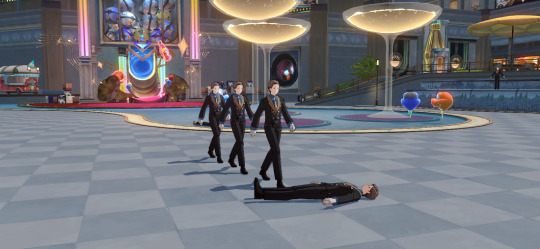
The Golden Hour base model and its uncanny inhabitants, found in Dewlight Pavillion. One of the Oak Family Head’s toys.
However, Freud’s point was not that repetition in infantile play is pathological, but rather that when trauma is repeated in adult life—a time when experiences do not feel so new, and therefore do not bring as much pleasure or sense of mastery per repetition²¹—the mind is reverting to a previous state,²² namely to the way it functioned in childhood. In other words, the repetition compulsion is related to the instinct for mastery, and trauma repetition is the mind’s attempt to master a painful experience by replaying the past in the present, as it did through infantile play. In this way, life itself becomes the game, or a “play,” and fantasy merges with reality.
Now, let’s examine the conclusion of Sunday’s stage play, as humans take fate into their own hands on the Genesis story’s seventh day:
2:1 THEY bestowed upon all beings the gift of ‘meaning.’ All had been brought into existence. And then, THEY rested from all THEIR creative work. 2:2 However, once again, all the beings beseeched Ena, praising THEM, the magnificent Aeon with divine power, but with a tone of curse. 2:3 ‘With Order, you have defined all things in the Cosmos, yet this only made us realize that we are mere puppets within your grasp.’ 2:4 Thus, on that day, all beings united and cast the Aeon into the pit of destruction. 2:5 And so it was done. That marked the seventh day. (Lost Property readable)
Like a parent guiding their child, Ena imbued the universe with meaning through Order, weaving the answer to each of humanity’s questions into THEIR grand symphony. Humanity then recognized its passive role in relation to Ena, a higher being who is able to act on the universe’s grand stage, while mortals merely watch THEM. And just as Freud’s grandson casts away his toys in the first part of the drama, humanity then casts Ena into the abyss to make THEM “disappear,” rejecting their old master in a bid for control only to seek THEM out again in the eternal show. In their effort to become masters, humans seal their fate as puppets; or by another interpretation, this is the intended outcome all along, because out of the two desires at play here—the desire to replace the master themselves and the desire to submit to another—answering to a new master is far easier than becoming one:
[Tiernan]: Sin Thirsters... the obsessions of the Pathstriders. They emerge from the depths of IX, seeing themselves as masters of their own destiny, unknowingly repeating the actions of their past lives. [Tiernan]: They emerge from the Nihility and head toward it, leading purposeless lives… (And on the Eighth Day) Butler: "Either I shall be my own master, or I shall return to my former master! I shall not submit to a new master under any circumstances!" "I wish they could regain their reason [calm down] and cast away the shackles of hypocrisy," proclaimed the new master. (Tune Butler's emotion to Calm) Butler: "Without a master, who can grant me true freedom?" (Everything that Rises Must Converge)
By returning the planet to Order, its Pathstriders hope to reinstate the earlier phase of galactic history before Ena was absorbed by Xipe the Harmony. Understood through Freud’s observations of infantile play, this can be seen as a struggle between retaining the innocence of childhood, the previous state, and the “grand wish” to become an adult with agency; desires that are at once contradictory, and yet work in tandem with one another. But is this really all that Sunday’s performance is about?
For the moment, let’s return to trauma repetition and its conflict with the pleasure principle. To Freud, trauma is like a bodily wound, where unfamiliar stimuli “breach” the mind’s protective layer and overwhelm it; the repetition compulsion is a response to this breach, replaying past trauma in the present so that the mind learns to anticipate the disturbance in the future:
“The fulfilment of wishes is [...] brought about in a hallucinatory manner by dreams, and under the dominance of the pleasure principle this has become their function. But it is not in the service of that principle that the dreams of patients suffering from traumatic neuroses lead them back [...] to the situation in which the trauma occurred. [...] These dreams are endeavouring to master the stimulus retrospectively, by developing the anxiety whose omission was the cause of the traumatic neurosis” (Freud, 1920, p. 26).²³
This brings us to the final pillar of Freud’s death drive. If the repetition compulsion is an instinct, then it must not only be common to all organic life, but also must originate from a shared disturbance in evolutionary history. But a disturbance of this scale, he realized, could only be found in what shaped life’s beginning—the physical and chemical processes that cultivated life on Earth, rousing the first unicellular organism from its slumber in the primordial soup, and animating what was once dead. The repetition compulsion, then, was born from this original trauma of organic life, unanticipated by that ancient sea. And if that is the case, then the repetition compulsion’s true purpose is clear: it aims to return the living to its slumber, to the death state, and it dutifully follows life’s “circuitous paths” to bring about that end:
“It would be in contradiction to the conservative nature of the instincts if the goal of life were a state of things which had never yet been attained. On the contrary, it must be an old state of things, an initial state from which the living entity has [...] departed and to which it is striving to return by the circuitous paths along which its development leads. If we are to take it as a truth [...] that everything living dies for internal reasons—becomes inorganic once again—then we shall be compelled to say that 'the aim of all life is death’ and, looking backwards, that 'inanimate things existed before living ones’” (Freud, 1920, p. 32).²⁴
The implications of this theory can be seen in Penacony’s oceanic imagery, which signifies both the unconscious memory of that primordial state and the salvation the sweet dream offers from reality. To enter the dream, The Reverie’s guests submerge themselves in a shallow pool and emerge on the “other side” reborn, baptized into the religion of pleasure and cleansed with the dream’s fiction. The primordial memory, then, is the lost childhood of organic life, a previous state it wants to return to — the unity before the violence of individuality.

Sunday: Some are born weak and vulnerable, some find themselves trapped in unfortunate circumstances, some fall victim to malice and cowardice. When it comes to survival, everyone is equal, and the weak can only watch as their value [future] gets constantly diminished by external forces. [emphasis added].
We also don’t need to stretch our imagination to connect all of this back to Sunday, who compares the weak to spectators of their own demise, just as Freud likens children to spectators of life’s phenomena, and perceives “external forces” as catalysts for change—for Sunday, they whittle away at one’s future, while for Freud they disturb a peaceful slumber.
How is all of this related to the Embryo’s tearful birth? The primordial soup was a cradle for organic life in its infancy, but it was also the “mother” that birthed it, and the death instincts compel life to return to its embrace. In Inhibitions, Symptoms, and Anxiety (1926), Freud identifies birth as the first “danger-situation” an individual experiences, because birth requires separation from their mother.²⁵ By coming into the world, newborns are inundated with unfamiliar stimuli, like the unexpected “breach” that characterizes trauma, and these sensations in turn produce the first instance of anxiety.²⁶ Though they can’t yet conceptualize this danger as the loss of their mother, for mental life at this stage doesn’t distinguish between the self and other objects, infants soon learn the uncertainty that accompanies danger can be relieved through their mother, who “satisfies all [their] needs without delay”; anxiety, then, is a response to situations where these needs go unsatisfied, and over which they alone have no control.²⁷
But birth is only the first separation between mother and child; the final separation, of course, is death. If the former’s danger is characterized by the mother’s absence (“object-loss”), then in death this danger becomes permanent. In Mourning and Melancholia (1917), Freud writes that mourning is a process of “[accepting that] the loved object no longer exists” and of withdrawing one’s interest (“libido”) from them.²⁸ Melancholia, its fraternal twin, shares several affective traits with this process, namely “a turning away from reality […] and a clinging to the object through the medium of a hallucinatory wishful psychosis”—that is, by living through fantasy.²⁹ Where melancholia distinguishes itself from mourning, however, is in one’s sense of responsibility for the object’s loss. In other words, the melancholic is tormented by a pervasive sense of guilt:
“In mourning it is the world which has become poor and empty; in melancholia it is the ego itself. The patient represents his ego to us as worthless, incapable of any achievement and morally despicable; he reproaches himself, vilifies himself and expects to be cast out and punished […] He is not of the opinion that a change has taken place in him, but extends his self-criticism back over the past; he declares that he was never any better” (Freud, 1917, p. 246).³⁰
Sounds a little familiar, doesn’t it? Transference is another way of living life through fantasy, where each new actor plays the same role in its infinite drama, in this case the “lost object.” The Charmony Dove, the fraudulent stowaway, and Robin all unknowingly take on this role in Sunday’s unconscious, as objects he is trying to protect. However, this performance is always fated to end the same way: his actions fail to save them, and he blames himself and his weakness for their loss.

If performance is the throughline between reality and fiction, then Sunday’s “play” in Penacony Grand Theater—the birth of his paradise and near-ascension as an Aeon—is yet another continuation of this eternal show. Sunday’s greatest wish, his infantile wish, is to protect everyone, and Ena’s dream facilitates its fulfillment through fantasy. To realize the dream, Sunday must usurp the power of a master (an Aeon) for himself, and he does so by fusing the Harmony and Order together to create the Embryo of Philosophy, making Xipe and Ena its 'mothers.' But the Embryo’s birth also requires the “death” of its creators, precisely because their power had to be stolen to create the eternal dream’s foundation. In other words, the Embryo must replace its parents so that it may truly become a master like them. Sunday's full performance encompasses both separations between “mother” and child at once: the separation through birth, and the separation through death.
In their Christian interpretation, the Embryo’s tears signify Christ’s empathy for human suffering, but in the psychoanalytic interpretation they suggest the Embryo’s anxiety about its performance. And this anxiety is well-founded, for all of the reasons we’ve discussed: the primordial danger of being born into the world, of emerging from “death” and becoming separate from it, and the threat of permanent object-loss if the Embryo completes the performance as planned. But we should also remember that this anxiety is in reality nothing new for Sunday, because he has already experienced all of these losses first-hand in the past. In other words, the Embryo cries because its performance reminds Sunday of something he’s experienced before, the very memory that he is trying to control—indeed master—through repetition. This memory, and the anxiety, concerns his wish’s original failure to materialize, the trauma of which laid the foundation for each subsequent “performance.” Plainly, it’s about the death of his mother, and his failure to protect her from the Stellaron disaster.
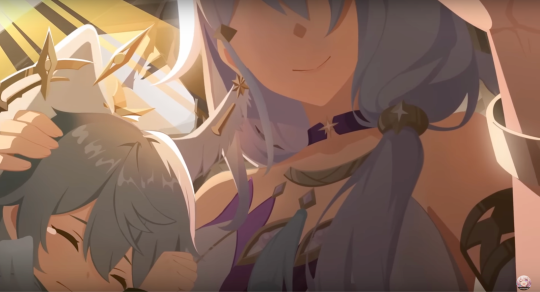
Given how he belabored the importance of his three decisions in his inner world, this may seem like a bit of a stretch. In fact, he doesn’t directly say a word about his mother at all — but that is exactly why I am so suspicious. Instead of acknowledging her with words, her death lingers in his desperate need to control outcomes, his preoccupation with weakness, and his yearning for guidance from a master, something he lost as a child when he needed it most. Perhaps this is part of what motivates him to become that master for everyone else, to replace the parent he lost by “becoming” them.
It’s also not lost on me that Sunday cries during the Stellaron disaster, further suggesting a narrative parallel between the Embryo crying and his past. In that moment, his tears highlight the incongruence between the image Sunday puts forth of himself as Robin’s protector, and the reality that he alone was never able to protect anyone. His mother died, Robin got shot, and suffering followed his decisions despite his kind intentions. From an early age, he had already given up on the possibility of sharing a stage with his sister, and eventually resigned himself to a grim fate as the universe’s lone star. While Gopher Wood’s role in reinforcing his unconscious belief should not be understated, I hesitate to say his poison is truly the belief’s origin.

“The echoes of the memories someone once held of their beloved family. Across the long night, they will accompany him in the past, present, and future.” (Echoes of Faded Dreams story)
What’s more, Sunday tells us that his end goal is not to resurrect Ena, but rather to construct his paradise on Ena’s remains, creating a world without Aeons at all. This infantile fantasy, a world without the “adult” influence of these higher beings, is a metaphor for his search for happiness after the meaningless Stellaron disaster that took his mother away from him, and to recover the innocence he lost with her passing. He seeks to create paradise from destruction, to build a new world on her remains, and become a master of it himself. Both his stage play and his role as the conductor of the paradise’s symphony only further cement this: through his performance, he asserts that he is no longer a passive observer of the disaster, no longer a spectator of his own demise or merely Gopher Wood’s puppet, but an actor and an artist in his own right. By utilizing the Stellaron to create paradise, he hopes to master his weakness.
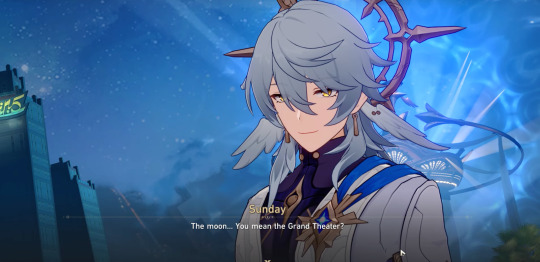
This symbolism goes crazy. What do you mean the Stellaron is a theater, it shines like the moon, it’s the reason Sunday’s mother died*, and it’s the site where he initiates Third Impact?
And I know, I know all of the Evangelion fans are saying “we fucking knew this already,” and you’re right! Hideaki Anno was also inspired by Freud, among many other psychoanalysts and philosophy giants, and Hoyoverse has never been shy about how much Anno’s work influences their own. It is undeniable that Shinji and Sunday share a character arc as it relates to the loss of their mother, and Sunday is far from the first and certainly not the last Hoyoverse character who will either, but where they differ is in the details of their death wish. In The End of Evangelion (1997), Shinji wishes for a world where he can’t be rejected by others, because there would be no meaningful difference between him and another person if they’re all just LCL soup, while Sunday wishes for a world where the weak never have to face their weakness, and weakness is no longer a “sin”; the outcome of both of these wishes, then, is a world where sin can never be repeated. But this tragedy’s ending was told from the beginning — trying to sever the cycle is the same as repeating it, and shedding one master means gaining another. Rather than preserving life and protecting it from pain and disappointment as he intended, Sunday’s dream world only guarantees its own end.
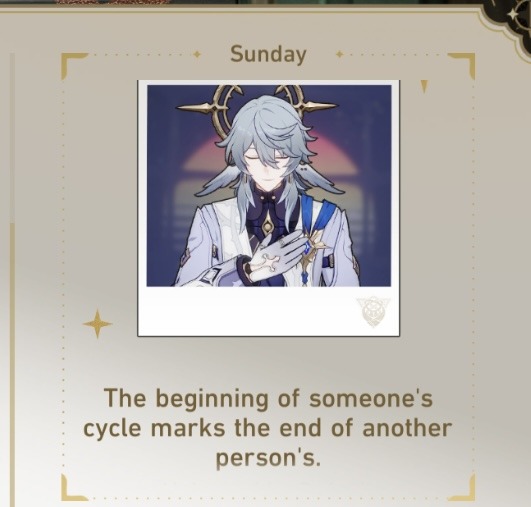
This is why the Embryo cries. Sunday’s performance is a reenactment of both the first and last severance between his mother and himself—his birth and her death—and the origin of the pain that would eventually justify the eternal dream’s creation.
*I say this with the huge caveat that Penacony lore, Halovian lore, and Sunday + Robin lore, are a bit (okay, very) confusing. It is possible their homeland was destroyed by a different Stellaron. Also, who am I to assume Halovian birth even remotely resembles human birth? I don’t know. Talk about how vague Halovian lore is right now in the version satisfaction survey and maybe we’ll get real answers.
Infinite Sin and the Will to Punishment
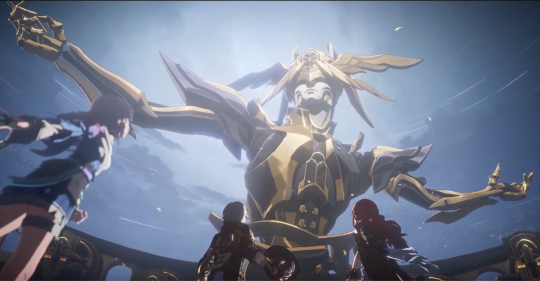
Unfortunately, it isn’t quite that simple. Freud did not believe that this pessimistic interpretation of the death instincts was the full story of the death drive, and this analysis, though fruitful, is full of apparent contradictions as a result of treating it that way. Though it’s not incorrect to assess Sunday’s actions from a self-destructive angle, this alone is an inadequate framework for illuminating the full extent of his hypocrisy. We see glimmers of it in Sunday’s inner world, when he admits the price of attaining his dream—“merely a personal and eternal sacrifice”—and in Penacony Grand Theater, when Himeko points out the fallacy that this could ever truly be a dignified existence for the many living under Sunday’s will. The tension between his willingness for self-sacrifice and desire for total domination is a core conflict of Sunday’s character arc in Penacony. These two aims constantly struggle to overcome one another, and within that struggle lies a truth about the nature of life and the meaning of Penacony’s story.
The seductive promise of Sunday’s paradise belies its reality, which requires the paradise’s conductor to remain awake until the end of time. Sunday minimizes the personal cost of Ena’s dream by portraying himself as a martyr for a noble cause, because to him this solitude truly is a meager price to pay for everyone’s eternal “happiness.” However, Robin is the first to point out that his role in sustaining the dream looks less like a heroic sacrifice than it does eternal punishment:
Robin: It's true that some people are born strong, and others are born weak. If the Trailblaze is the target of heroes, then the Harmony will guarantee that the strong help the weak. Only the people of Penacony themselves can be the saviors of their homeland. Robin: Their path of happiness should be forged by themselves. While I may not be a Nameless, I'm willing to instill courage in all those who need it. Robin: This includes my brother as well. Ena's Dream... is too cruel for him, and everyone else. […] Robin: Brother, you have heard their cries... This is not the paradise they hoped for. "Harmonious Choir" The Great Septimus: Even so, they don't know where they should be heading. That's why... I had to become the lone star in the sky to guide them. Robin: Even if that star... must hang in a perpetual night of solitude? (And On the Eighth Day)
And one does have to wonder: why would Sunday, who has clearly demonstrated his own desire to turn away from the pain of reality, deliver a fantasy world that promises just that to everyone but himself? To begin to unpack this, let’s return to the idea of guilt, which we briefly touched on in the discussion of melancholia.
Before developing his death drive theory, Freud attributed a wish for punishment to dreams and behaviors which, on their surface, contradicted the pleasure principle’s tendency to avoid pain.³¹ These dreams, he argued, represented a masochistic tendency in human nature, where “[pain] for one system [is pleasure] for the other.”³² But Freud’s understanding of masochism changed with Beyond the Pleasure Principle, which raised the possibility that masochism was originally a death instinct that was altered by the life instincts to serve the pleasure principle.³³ He was then able to take up masochism with a newly instructive angle in The Ego and the Id (1923), where he formally introduced not only the term “id” for the realm of the instincts, but also the “super-ego,” an omnipresent and judgmental conscience that defines the ego ideal.³⁴
The super-ego is a representation of the ego’s parents and their teachings, reborn from the ruins of the Oedipus complex and its unfulfilled wishes. The Oedipus complex is named for the ill-fated protagonist of Sophocles’ Oedipus Rex, who unknowingly murders his father and marries his mother, thereby fulfilling a prophecy he sought to avoid. After he is made aware of his moral failings, he blinds himself in shame and goes into exile from his former kingdom. In The Interpretation of Dreams (1899), Freud describes the Oedipus complex as an early stage of child psychosexual development where the child’s parent of the opposite sex is cast as their first sexual object.³⁵ But this nascent sexual attachment creates a dilemma for the child, because in order to fulfill the Oedipal wish (attaining a “union” with the loved-object), they have to triumph over their rival, the parent of the same-sex. The child then develops an “ambivalent” attachment to their same-sex parent, where the familial love they have for them is complicated by their desire for the other parent.³⁶ However, the child soon realizes that its options to fulfill the Oedipal wish are untenable with reality, and the price of achieving it is severe punishment at the "rival's" hands.³⁷ It then abandons the Oedipal wish by repressing it, instead developing a strong “identification” with the same-sex parent—that is, instead of trying to kill the father to be with the mother, it tries to become like him.³⁸ This identification establishes the ego’s moral framework.

On the left, Sunday crying in his ultimate animation. On the right, a photograph by Albert Greiner of actor Louis Bouwmeester as Oedipus after blinding himself in Oedipus Rex. This shit, as they say, writes itself.
Penacony’s environmental design references the super-ego through its persistent eye motif, which represents surveillance in the sweet dream and introspection in the primal dreamscape. In addition to its psychoanalytic roots, the eye motif in Sunday’s character design both furthers his angelic iconography and visually connects him to Ena, whose eye represents THEIR sovereignty over mortals through the law.
Surveillance is central to any system of government that prioritizes control like the Order does, and the resulting paranoia of such a system encourages rigid adherence to its rules. Likewise, the super-ego watches the ego’s thoughts and actions for signs of transgression and punishes it for every immoral impulse, whether acted on or merely imagined. The threat of punishment is what motivates the ego to enforce the super-ego’s imperatives, repressing impulses that fall outside the sphere of moral acceptability and casting all that is not orderly outside of what comprises it. In Penacony, the analog for the super-ego is most closely found in Gopher Wood, the Dreammaster, who oversaw the sweet dream’s descent into hedonism in order to strengthen his influence and nurture the Stellaron. This is also why he is often embodied as a raven who spies on Penacony’s scenes, acting as Sunday’s “eyes” to maintain control of all the actors.

“Something Unto Death”
It should come as no surprise, then, that the super-ego also plays a crucial role in the eternal show. The super-ego is built on the teachings and morals of the past as embodied by the individual’s parents, and these values guide the ego in the present so that the ideal may be attained in the future; in other words, the super-ego ensures the past’s survival through its repetition in the present so that it becomes one’s future.³⁹ Of course, the super-ego is not literally the ego’s father, but rather a representation of him recreated within the mind.⁴⁰ Perhaps this is why Gopher Wood is able to “speak” through each Oak Family member in the present, despite his body’s immolation in the past — his rules survive in their minds as the supreme source of moral guidance. That, and dream logic.
As both a political and religious fundamentalist leader in the dreamscape, Gopher Wood radiates the “Father” archetype, marking him as an authority not only of Penacony’s civic prosperity, but of righteousness itself. Because of this, he is a surrogate for divinity—for Xipe the Harmony in public, and for Ena the Order in private—capable of judging the ego in "God’s" place. While this relationship to some extent applies to all Oak Family members, it is especially true for Sunday and Robin, for whom Gopher Wood literally plays the role of their adoptive father. For Sunday, as Gopher Wood’s successor in the Oak Family and tool of the Order, this takes on an even greater significance. Their relationship constitutes a faithful representation of the ego and the super-ego, where Sunday is taught by Gopher Wood to uphold the Order’s ideals to be a morally righteous person, and to repress all of his ‘imperfection’:
“As a substitute for a longing for the father, [the super-ego] contains the germ from which all religions have evolved. The self-judgment which declares that the ego falls short of its ideal produces the religious sense of humility to which the believer appeals in his longing” (Freud, 1923, p. 33).⁴¹ “It's said that the master of this pavilion suffers from severe compulsions, but this table clearly shows that he has been cured.” “Unlike a long table, round tables have no sense of priority or opposition, it is very likely that they are an Aeonic candidate for the Path of Harmony” (Conference Round Table investigations in Dewlight Pavillion) [emphasis added].

Killing the “Father”....to be with the “Mother”?
But the super-ego’s standards aren’t truly meant to be achievable for the ego, because the ego’s identification with the parents is defined by its difference from them; to disrupt that identification would be to confuse the ego’s sense of self.⁴² This is yet another manifestation of the ego’s conflict between remaining subservient to its “master,” the super-ego, or overthrowing it to become the new master:
“[The super-ego’s] relation to the ego is not exhausted by the precept: ‘You ought to be like this (like your father).’ It also comprises the prohibition: ‘You may not be like this (like your father)–that is, you may not do all that he does; some things are his prerogative’” (Freud, 1923, p. 30).⁴³
Thus, the ego creates an impossible task for itself. It wants to be seen as a morally righteous subject, and it tries to achieve this by modeling its every thought and action after the “Father.” However, the ego can never truly censor all 'impure' impulses, and for this reason it will always be deserving of punishment; this is the source of the ego’s persistent sense of guilt.⁴⁴ The tension between the super-ego and the ego is what Freud referred to as “moral masochism,”⁴⁵ wherein the ego not only fears the super-ego’s punishment, but also unconsciously desires it. Moral masochists do not care who punishes them and do not limit their suffering to sexual fantasies—instead, “the suffering itself is what matters.”⁴⁶
This desire is the result of several transformations that occur in the death instincts. Earlier, I mentioned that we were working with an incomplete understanding of the death drive—that the purpose of life is to return to death. But life is almost never this frictionless, and neither is instinctual life. In reality, the death instincts all trend toward self-annihilation and restoring the state before life, but the life instincts persist alongside them to preserve life. Taken alone, they are only capable of stagnation; together, as each struggles against the aims of the other, life can evolve and progress into new territory, ‘blazing a trail’ towards new beginnings — “life itself [is] a conflict and compromise between these two trends.”⁴⁷ To make "life" possible, the death instincts are fused with the life instincts, making it difficult if not impossible to observe any one behavior that purely exhibits the death instincts.⁴⁸
One product of these fusions is the sadistic instinct. In The Economic Problem of Masochism (1924), Freud affirms what he had only surmised in Beyond the Pleasure Principle—that sadism is an inversion of a primary masochism, where what was once a death instinct bent on self-annihilation is now a “destructive instinct” fused with Eros that seeks to 'master' others:
“The libido has the task of making the destroying instinct innocuous, and it fulfills the task by diverting that instinct to a great extent outwards [...] towards other objects in the external world. The instinct is then called the destructive instinct, the instinct for mastery, or the will to power” (Freud, 1924a, p. 163).⁴⁹
But a portion of that aggression is retained in the ego, attached to the super-ego (the 'master'), and redirected towards the ego; hence, moral masochism.⁵⁰ In other words, the desire to punish others is reconfigured through the super-ego as a desire to punish oneself.
So what does “punishment” mean here? Freud concludes The Ego and the Id by arguing the fear of punishment is really a fear of losing love and protection from the parents, “Destiny,” or the super-ego. If their love is only garnered through moral behavior, then immorality risks its withdrawal. Without love, the ego is vulnerable to the world and its dangers, and to the possibility of its death—thus, the fear of punishment is really the ego’s fear of death, and consequently, its desire for death:
“The fear of death in melancholia only admits of one explanation: that the ego gives itself up because it feels itself hated and persecuted by the super-ego, instead of loved. To the ego, therefore, living means the same as being loved [...] But when the ego finds itself in an excessive real danger which it believes itself unable to overcome by its own strength [...] it sees itself deserted by all protecting forces and lets itself die” (Freud, 1923, p. 61).⁵¹
Now, let’s consider the origin of Sunday’s melancholy, his failure to protect his mother. This ‘sin’ is at the center of his performance, and it is the pain he keeps repeating over and over again. He repeats this pain because he feels guilty for being too weak to protect his loved ones, and that guilt finds its source in his severe and unforgiving super-ego. Sunday suffers immensely from the responsibility he feels for everyone’s happiness, let alone his loved ones’ safety; it is strongly implied that he has obsessive-compulsive disorder, a condition that likely wasn’t helped by the Order’s strict rules. But Sunday fundamentally suffers for the same reason that everyone else suffers — because ‘sin’ is infinite for imperfect beings, and no amount of repression can change that. The guilt he feels for this is also infinite. One of the reasons that Sunday volunteers himself as the Order’s sacrificial lamb is because he believes the suffering of others to be of higher importance than his own, certainly, but it is also because of the self-punishment he is promised through the plan’s outcome. In other words, his infinite solitude is a form of justice for his original sin and is, by design, a death sentence.
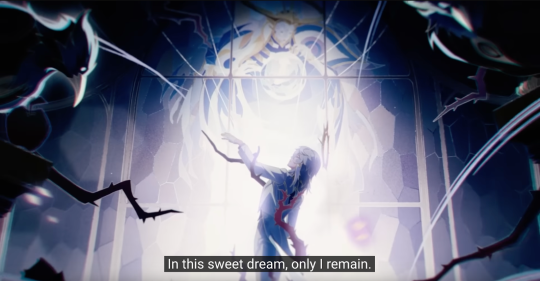
This leaves us with our final contradiction to untangle. The deceit of Sunday’s dream world is its benevolent veneer, which obscures the violence of its compulsive unity at the expense of individuality. Before his performance in Penacony Grand Theater, Himeko acknowledges Sunday has “a strong conviction and a desire for dominance” that cannot be satisfied through debate alone; he derives far more pleasure from demonstrating his superiority through example. We witnessed that aspect of his personality firsthand when Sunday subjected Aventurine to a trial from the Harmony and branded him with its death sentence, an outcome he took utmost care beforehand to ensure was predetermined. However, when Himeko calls Sunday on the hypocrisy of his martyrdom, he dismisses it and shuts down any further debate:
Sunday: True goodness can only be achieved through faith. Himeko: Allow me to point out that falling into a permanent slumber is not happiness, especially when those people are driven by someone else's will in their sleep. […] Sunday: My sole objective is to create a paradise free from Aeons, where the Order ensures the dignity and happiness of all humanity. A paradise exclusive to us human beings. Himeko: That's not the case. If people are to live with dignity, there must be nothing and no one above them. Himeko: In your so-called paradise, you would be the one reigning supreme. Sunday: Looks like we won't be able to convince each other. Now that our conflict has been destined, let's unveil our Paths and reveal to the universe the true path. (Everything that Rises Must Converge)
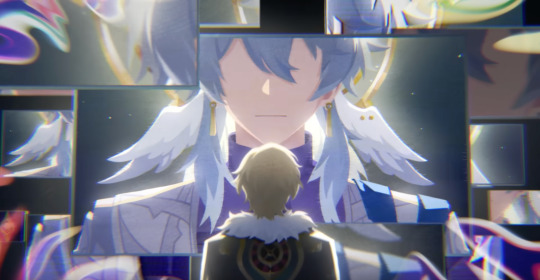
You know he enjoyed every second of this. (From Aventurine’s “A Moment Among the Stars - Inherently Unjust Destiny” trailer).
Circumstances aside, good intentions or not, Sunday is not without his own stubborn will that he imposes on others. Acknowledging this neither throws everything we’ve discussed beforehand out the window, nor does it suggest that Sunday’s martyrdom isn’t genuine. It does ask whether emphasizing Sunday’s martyrdom at the expense of his capacity for sadism is possible without disregarding his agency. In other words, Sunday did not create a dream world that excludes himself by design solely to punish himself and move closer to death; the control it offers him over others, though illusory, is just as appealing. Playing “God” in this way is an extreme and, in a sense, ‘aggressive’ expression of his own will to life, an equally fervent wish to surpass his “master,” protect the weak, and forge a new beginning.
In Sunday’s manifestation of Dominicus, we see both the sadistic instinct and the masochistic instinct represented as two sides of the same being. On one side is the confident and domineering Septimus, who, as the maestro of the eternal dream, embodies the sadistic instinct for mastery over others; on the other side is the Embryo of Philosophy, representing the masochistic instinct to return to the mother.
We’ve already discussed the Embryo of Philosophy at length, but Septimus also merits closer attention. In contrast to the Embryo’s fragile, withdrawn posture and emotional vulnerability, Septimus is towering, ostentatious, and grandiose; it makes wide, sweeping gestures that cover the entire stage, carrying itself with an authority that commands the audience’s attention. Indeed, Sunday puts on a voice as Septimus**, lowering his pitch and raising its volume so that it booms with the power he so desperately craves. Even its title, “The Great Septimus,” reads more like a character in a child’s fantasy than a threatening embodiment of Order with the means to suppress autonomy. In other words, Sunday treats Septimus as a persona, an image he wants to project into the world, or a “fictional” version of himself; plainly, it is a manifestation of his ego ideal.

The destruction of this nascent Aeon’s body therefore holds great significance as we move into the conclusion of Sunday’s character arc, at least for his role in Penacony. Dreams exist in the liminal space between reality and imagination, much like the “self” straddles the ideal and the real. Destruction and creation are rules of the universe that can’t be transcended, and the “self” is always in flux; but because of this chaos, there is always a chance to change one’s fate. Septimus represented Sunday’s infantile wish to protect everyone, no matter the cost, and the Embryo of Philosophy signified his desire to remain the same forever, as he was in childhood. Without their armor to protect him from reality, he once again faces the primal fear of life and the inevitability of one’s death. But rather than letting himself die in an ocean of guilt, there’s a chance to write a new ending to his ill-fated play.
**It’s apparent that the boss’s voice has certain effects on it that contribute to this, but I noticed something a little more than that while listening back to some cutscenes that I believe were acting choices on the VA’s part. Also, this judgment is based on the English dub.
TL;DR: someone get this man some serotonin immediately.
That’s it! I really wanted to include an analysis of Sunday’s new outfit here that ties it to Nietzsche’s The Birth of Tragedy and back to The World as Will and Idea, but I ran out of time. :( It will have to wait for another post. Thank you so much for reading <3
References:
Numbered external citations with page numbers can be found here:
https://pastebin.com/2jXQGTHk
List of Freudian Texts Referenced:
Mourning and Melancholia (1917) Beyond the Pleasure Principle (1920) The Ego and the Id (1923). Page numbers are given from my hard copy. The Economic Problem of Masochism (1924) The Dissolution of the Oedipus Complex (1924) Civilization and Its Discontents (1930). Page numbers are given from my hard copy. Inhibitions, Symptoms. Anxiety (1926)
Other Texts Referenced:
The World as Will and Idea by Arthur Schopenhauer. Page numbers are given from my hard copy. Freud (2015) by Jonathan Lear, 2nd edition. Page numbers are given from my hard copy.
Further Reading/Watching:
I highly recommend this article series by solenestuaries of Hyperion Team 3rd on substack. The first is Honkai Impact 3rd focused, the second is a mix of Honkai 3rd Part 2 and Honkai: Star Rail 2.0 focused:
Part 1: What do we talk about when we talk about dreams?
Part 2: “Why does life slumber?”: Dreams, Entropy, and the Many-Worlds of Quantum Mechanics
I am greatly indebted to her analysis for convincing me to go beyond Freud’s A General Introduction to Psychoanalysis. Her grasp of psychoanalysis and schizoanalysis is staggering and thought-provoking. Do yourself a favor and read all of her articles!
Destruction as a Cause for Coming Into Being by Sabina Spielrien. The inspiration for Beyond the Pleasure Principle.
Origins and Mysticism of the Death Drive in Psychoanalysis & the Philosophy of Transgression by ESTOERICA. I was wayyy too deep into writing this post by the time I discovered this video, but please for the love of god just watch it and prepare to have your mind blown.
88 notes
·
View notes
Text
Part 1: Friendship, Slavery, Servitude.
I’m splitting these into several parts, not because they’re going to be particularly long, but because it’s easier to organise my thoughts this way.
I want to start with the basis of his character and the stuff I say here is going to be the foundation for whatever I say in the future. Of course you’re free to disagree these are just my thoughts and opinions from what we’ve seen in the text and if you have your own I would love to hear them.
Anyway, the first thing I have to address is the English verses the Japanese translation.
From what I understand the English version heavily censors the reality of Jamil’s situation, and while I won’t go too in depth on it because that’s not what I want to talk about, these changes do heavily affect his character and the way some fans view him, so if you haven’t read the Japanese twst translation please do.
There are several fan translations online that give a clearer understanding of the situation and I will be basing all of my analysis on the Japanese version.
Okay now to actually begin.
What I want to start off with is what exactly is Jamil’s position within the Asim family household?
It is extremely muddled in and out of game and it seems to be a point of contention among fans from what I have seen.
The English translation has Jamil commonly referring to himself as an employee, with Kalim’s dad as his boss, while in the Japanese version he exclusively refers to himself as a servant with Kalim and his father being his masters.
Of course not only does the English translation make it extremely unclear what exactly Jamil is, but the characters in game seem equally uncertain.
And by characters I am referring to Kalim who prior and a little bit post book 4, despite being aware of his and Jamil respective positions still exclusively referred to them as friends.
Now this is one relationship term that I will not agree on at least not pre book 4. I really don’t consider him and Jamil to be friends until book 7, as the time between then is mostly spent with Jamil growing to a place where he can actually accept Kalim’s friendship and Kalim coming to understand and recognise the power he holds over Jamil.
Despite this I often see them referred to as childhood friends. However the way I see it is that to have a functioning friendship both partners have to be equal, and not in a power dynamic sense, I don’t think it’s impossible to be friends with your boss or your teacher or something, but coming from a labour perspective both people should be putting roughly the same amount of effort into a relationship otherwise it quickly turns toxic.
From a purely physical standpoint it is undeniable that Jamil is putting in far more effort, he is Kalim’s attendant and we see in multiple story vignettes and events that Kalim has no qualms about using Jamil for physical labour.
However from an emotional standpoint it gets tricky especially when looking at pre and post book 4.
Kalim was very emotionally invested in their relationship he considered Jamil a friend and since they grew up together I imagine that there were some points in his childhood were he ended up going to Jamil for comfort.
And while I’m absolutely certain he would’ve wanted Jamil to come to him and was likely under the impression that he was providing equal emotional support the reality is this is not the case as Jamil says that he was forced to repress any resentment or anger that he held towards Kalim because Kalim was his master.
This means that the friendship that Kalim assumed they had was wildly imbalanced as Jamil was forced to contribute a lot of physical and mental effort to the relationship that wouldn’t and couldn’t be reciprocated.
And again, this is also not to say that Kalim didn’t care about Jamil, or vice versa, because I definitely think there were at least some genuine moments of friendship during their childhood when they were both still too young to understand their respective positions in the hierarchy they were operating under.
However Kalim’s wealth as well as the power dynamic between them meant that having a balanced relationship with Jamil was always impossible, which again in itself is not the issue, it’s the fact that Kalim never acknowledges this (until book 7) that is.
But as far as I’m concerned it is not a friendship when one person is essentially being forced into and actively harmed by the relationship.
Not to mention the fact that Jamil states numerous times that they aren’t friends should be the end of it. Idk I want to specify this because I see so many people acting like Jamil betrayed their friendship but the situation is a lot more complicated than that.
Also referring to them as friends feels like softening the reality of what happened for Kalim’s benefit.
So going forward note that unless we’re discussing post book 7 then I do not consider them friends and will be analysing their relationship with that in mind.
Of course if Jamil isn’t Kalim’s friend then what is he?
Well the discourse I see surrounding this mainly comes down to whether Jamil is considered a slave or a servant.
Although he is never officially stated to be a slave in either version of the game it is still fairly grey territory as the way his servitude is described can definitely be interpreted as something far harsher than a regular employment.
He is not working for the Asims willingly. That much cannot be contested when his entire character revolves around the freedom he wishes to have away from Kalim and his family.
I think the main way to answer this question however is to first consider what makes someone a slave.
Slavery has existed around the world for millennia, however many different cultures had many different practices around how slaves were treated, what could and couldn’t be done to them, what legal rights they did or didn’t have.
I think coming at this issue from a purely westernised view of what slavery is, is obviously wrong, however there is also no way to land on one perfect all encompassing view of what slavery is and whether Jamil does or does not tick those boxes, because things are more complicated than that.
I for one would consider him a servant, however it’s still more nuanced because despite being what I consider a servant he is still not necessarily an employee as most servants are because what he’s doing is still involuntary/forced labour.
I’m sure several people reading this have different opinions and I think it’s important to showcase why someone might be conflicted over this.
I think it’s unfair to completely dismiss anyone who does think that someone who is forced to work against their will a slave.
I mean Jamil being born into his position as we find out at the end of book 4 during his backstory means he had no choice or control over his employment as the Vipers have been working under the Asim family for generations.
It’s also a position he’s been in since he was a child as Kalim often mentions that he and Jamil have been friends from a very young age and while this doesn’t imply slavery directly it does show that when it comes to things like child labour the laws in the scalding sands are a lot more lax compared to our own.
Also the fact that he has no way out of the situation. I mean Jamil makes it very clear that he does not want to work for Kalim at the end of book 4 essentially making what he’s been doing forced labour because he is being threatened/coerced into it.
Jamil mentions that were he to disobey Kalim the consequences would be dire and might put his entire family at risk. He frequently worries about what Kalim’s father might do to him if he were to disobey.
Now those are reasons that point to the relationship being more slavery than servitude, however there are also reasons this may not be the case.
Even small things like him being allowed to take breaks, though it’s unclear how rigid these are as Kalim would often disrupt them which would force Jamil back to work he was still permitted to take them.
And the fact that he was allowed to go to NRC without Kalim.
Regardless of whether he was a slave or a servant the fact that he was able to attend a boarding school across continents, alone while keeping his job is pretty substantial.
I do think it’s worth mentioning that at the time he was given the acceptance letter as well as the few months he attended the school without Kalim there was another member of the Asim family attending the school. I don’t know if this changes anything regarding his attendance but I thought I should at least add it in.
But that along with the fact that he attended school at all seems to show he had some freedom over his life as attending school would’ve taken several hours out of his work once again, which could imply he had a more flexible schedule than we’ve been lead to believe.
I also couldn’t find any source on whether or not the Vipers are paid. Which honestly I think would give us the biggest insight into all of this, but regardless I think it is important to note that across different time periods and cultures all of these points for and against could be applied equally to slaves and servants.
Sometimes slaves were paid and permitted an education, sometimes servants were born into their position and exploited it will always depend on the time period and culture you’re looking at.
I mean again I understand why anyone would consider forced labour to be slavery and I myself am not really sure how to label his position because it feels simultaneously too controlled to be servitude and too lax to be slavery.
I tried looking stuff up and I found the definition for modern day slavery referred to it as: A situation of exploitation in which a person cannot refuse or leave because of threats, violence, coercion, deception, or abuse of power.
Which I think is an apt description of Jamil’s situation and of course no matter how you look at it he is not willingly working under Kalim and in fact the whole reason for his overblot in book 4 was an attempt to garner his own freedom.
Also (and this is something that I will elaborate on further at some point) some of the tasks he is made to do, make it seem like either being fired is one of the worst things that could happen to him, his family genuinely do not have the power to quit, or his parents really, really suck.
My own personal theory is that the Vipers are indentured servants. I saw a theory floating about that all the overblot boys are somehow related to the great 7, which if true would explain why the Vipers have been serving the Asims for so long since it could be a punishment.
Regardless I hate the fact that some people who consider Jamil a servant somehow act as though this makes his situation any better? I mean I’d say regardless of whether you consider this slavery or servitude it changes very little about his actual situation.
I saw someone on twitter say that Jamil couldn’t possibly be a slave because that would make his relationship with Kalim unsatisfying, which is honestly the most infuriating thing I’ve ever heard, because I think any relationship he has with Kalim is always going to be unsatisfying (at least to me) if he’s still a servant.
But then again it is twitter so I don’t know why I bother listening to people’s opinions.
Anyway all this to say I’ll be referring to him as a servant throughout this analysis, mostly because that’s how he refers to himself.
Anyway it seems I’ve lied, this turned out to be a lot longer than I thought it would be which is a pattern that may or may not continue I have no idea.
Once again if you have anything to elaborate or disagree on then leave it the comments, but please be respectful.
Oh and also my writing style will absolutely be changing from section to section. Sorry in advance.
I’ll see you whenever I finish the next part of this series.
Oh and sorry for any spelling mistakes!
Part 1 Part 2
33 notes
·
View notes
Text



₊˚.- NEEDLES AND PINS
Patience breeds success. However, Dr. Veritas Ratio's patience has successfully run thin when it comes to the Intelligentsia Guild's new professor.
OR
Dr. Ratio hate reads about you.
wc - 3.4k
A/N - Basically a Dr. Ratio character study, inspired by the Deftones song Needles and Pins.

Veritas Ratio was a Needle.
At least, that is what he saw himself as. He was sharp, precise, and calculated. One had to be in this world full of ignorant minds.
His known prestige amongst scholars was by no accident. Every equation, formula, and theory engraved into his mind was nothing he didn’t want there. His reputation at the Intelligentsia Guild was by no fault other than his own. And he liked it this way.
So when Dr. Veritas Ratio’s curiosity peaks, he will seek out information regardless of what stands in his way. It just so happens that the rumor of a Genius Society member abandoning their ranking to join the Intelligence Guild not only piques his interest but puzzles him quite a bit.
Everything Veritas Ratio has ever done—ever accomplished was with intent. That’s just what a needle does.
And as he reads the passage before him in the worn textbook he fished out of the bookshelves at his university, he intends to figure out your perplexing nature.
“…and discovered five different constellations that are now crucial to Intercosmic Space Travel, earning the name of the ‘Star Lit Genius’ just after finishing her Associates.”
- Excerpt from Exploring the Starlit Genius
A fool.
Ratio closes the bulky biography with a booming thud. The echo can be heard bouncing off the walls of his office.
That is what you were. That is your nature.
A fool is the only description he can think of as he sharply brings his fingers to his lips. Questions bubble inside him, but the one that escapes himself is, “Why?”
Why would anyone do such a thing? The mere thought that someone could leave the Genius Society was baffling. Sure, there probably were some that had left, but that had to be Amber Eras in the past.
It wasn’t ignorance it was foolishness. Perhaps he was right about Genius Society members having a rock up their asses. There was truly nothing that separated them from the mundane, such as himself. They were just as equally subjected to idiocy.
But could you do such a thing?
You. A scholar blessed by Nous! Given a chance—an opportunity.
He scoffs, his head jerking to the side as if catching himself in an act.
He shouldn’t care.
He doesn’t care.
He’s over that.
Ratio sighs and shakes his head. He doesn’t care. You were foolish, that’s all. It was nothing more.
But who might this fool be?
Ratio’s cold finger travels around the textbook's hardcover. He quickly flips through the pages. Frustration is evident on his face as his brows furrow the more pages he turns.
Yet, there’s nothing.
There’s not one picture of you—the fool—that perplexes his mind. Of course, there wouldn’t be. The Genius Society's “holy” standing wouldn’t allow that. So, he’ll just have to wait for the day he meets the deluded “genius.”
“Immediately after finishing her Associates, the Star Lit Genius earned funds from the IPC for her findings, causing the young brilliant mind to venture more deeply into the cosmos.”
- Excerpt form Exploring the Starlit Genius
Time had passed and life went on. It had been a month since Veritas’ initial read of your biography. He had learned much. Such as your main fields of anatomy, pathology, chemistry and of course astronomy. Little details of your past are stored neatly in the back of the Doctor’s mind, but he has had no use for it. The new semester had started and as time went on he too started to carry on. Students plagued his mind instead, yet a star glittered somewhere near.
“Dr. Ratio.”
It’s no voice he’s familiar with. Or maybe one he’s just not accustomed to yet. Most likely a new student in one of his classes.
He doesn’t even bother to look up. Instead he continues to shuffle through his papers with equations and calculations of the new curriculum that he would soon ignore altogether in his lessons.
He sighs. “Students are to ask questions during the appointed time.” His voice lacks any interest whatsoever.
He was tired of students who seemed to think they were special. If anything, the unfamiliar voice is probably a student coming to butter him up before the semester starts to get on his good side.
“Oh, I’m not a student.” Your voice isn’t familiar, but the syllables that roll off your tongue are ever engraved into his mind. His inner consciousness has read the name so much that he can envision the letters.
Before he looks up, a smug grin shows on his face. Finally, he could put the foolish mind to the face. It was a gift, really. You, coming straight to his door. You had done all the work for him.
But then he takes his first look at you.
Veritas Ratio isn’t one to be rendered speechless, but his surprise is evident. His grin drops at the sight of you. Before, he had imagined that he should have put on his mask of marble to forbid his eyes from the sight of such a foolish person. But now his frustrations were fueled even more by the undeniable fact that a fool could look like…you.
“Professor Alvarez said you would be the person to go to regarding any Physics textbooks,” you say, and Ratio comes back to reality as your voice vibrates around the large space. You stand in the wide door frame, hands held together in front of you.
“Ah,” he chokes out. “Our new professor.” He quickly gets up to walk to the bookshelf behind him to rid the sight of you. His steps are light but eager; however, his back stands straight, and his head is held high. This was it? This was the fool he had read about? What a pity, he thinks as he climbs a few steps up the ladder of the bookshelf. Looks wasted on a simpleton.
Ratio tries to change the topic of conversation while trying not to show his evident surprise. “Say, what does an astronomer have that warrants the need for physics?” He questions.
You're quick to answer. “Well, the two are connected, I’m sure you’re aware.”
He is aware—he’s well aware. But he’s also aware of his unwelcomed knowledge of your hatred for anything purely mathematical in any sense, especially physics, which you loathe the most. He even remembers the page clearly in chapter twenty-six, section fou—but that's beside the point. His ever-growing facts about you are a card he cannot yet play. He has only gazed at you for a mere eight seconds. So for now, he will keep his mouth shut.
“I am,” he says confidently, a slight hint of offense in his voice. “Professors here, however usually tend to their specific fields rather than branching off.” His fingers trace the spine of the dusty books before carefully selecting one and then another.
“One of my students is infatuated by the correlation of the two. It’s something that I had no interest in during my years of studying.” The sound of you shuffling your feet bounces off the walls. “I’m forced to learn now I suppose.”
“Whatever for? You’re no physicist,” he scoffs. His hand lingers around a book as he debates himself in his mind.
“To answer my students' questions, of course,” you answer without a second thought.
A genius interested in the pursuit of other’s knowledge. Ratio’s frustrations physically manifest in the form of a silent sigh. An anomaly you were. An Irritating one at that.
He picks up the book.
He doesn’t say anything as he descends the ladder—or when he walks to where you stand with an uninterested look on his face. He simply plops the books in your hands with a quick “Here.” Their weight jolts you down briefly.
“Some of these are limited or editor's copies.” His eyes meet yours for the first time since you came in. “Do try not to dirty them.”
He turns to walk back to his desk, but the sound of your voice stops him.
“Which is your favorite?”
Ratio turns to walk back to you as he looks you up and down. His fingers fish between the books in your arms, and he pulls out one. It’s encased in golden leather. He lifts it up to hold it out in front of you.
Your hand grazes the hardcover. You look at it, eying the author. ‘Professor Emeritus.’ You look up at him with a hint of playfulness in your eyes. It makes him uneasy—like the breath has been sucked out of his lungs. But then you have the nerve to smile at him, and he can feel himself getting hot.
“Thank you,” you say, and you turn away.
His mind races. His heart beats a bit faster. It’s only when the click of your heels are out of earshot and when the doctor is trying to recover in his desk chair that he realizes he’s forgotten to tell you when to bring them back.
“...the only way to transcend the limitations of the individual is to have an academic network of mutual learning.”
- Intelligentsia Guild
He ignores you.
That’s not to say he doesn't see you. Of course, he does. How could one not see you? It has turned into a game over the past two weeks. He must spot you first to make sure you do not spot him.
So he does just that.
He has no use conversing with a Genius Society member turned idiot. He simply gave you those books to help the students you were teaching, nothing more.
So he carries on with his usual routine of avoiding you. Until, there’s a pile of books with ribbon wrapped around them at his office door. But there’s only three of them.
Ratio quickly picks up the stack of books and unlocks his office door. When at his desk, he finally notices the note placed neatly between the book and ribbon.
Thank you for letting me borrow these. They were very insightful. I have saved your recommendation for last. I will bring it back once I have finished it.
He examines your handwriting—your signature—and how the way you write your A’s and H’s differ from him.
As Ratio revels in the fact that you took his word at face value, he examines the books. His fingers caress the covers and flip through the pages.
You made sure not to dirty them.
“To grow and excel as a Scholar is to reconsider. A Hypothesis that is drawn due to stubbornness and ignorance is a hypothesis from no mind worth listening to.”
- Professor Emeritus in “Attentive Beings”
“Come in,” Ratio replies to the three knocks on his study door. This time, he looks up from his reading as soon as he hears the heels click on the polished wooden floor.
You smile at him���book held in hand.
He greets you with another disinterested look as he turns his head back to the papers in front of him. “Did you enjoy it?”
“I certainly did,” you call out. Although he doesn’t look at you, he can hear you walk slowly around his office. He lets out a sigh as he writes down something.
But then your heels click too close to the round table by the window in the corner of his study, and his mouth grows dry. He looks up as he watches you eye the books he had left open on the table, and put the book you had borrowed down. Your fingernails graze the papers slowly, and you turn the page.
“You read about me?”
Ratio’s throat closes up at your question as he scurries to organize the files and loose sheets of paper before him just to occupy his hands. He puts a fist to his lips and clears his throat. “I simply wanted to know more about the new Professor who would teach some of my former students,” he affirms boldly.
“It’s okay.” your eyes lift up from the pages and turn to him with a smile. “I read about you too.”
He’s not surprised. He shouldn’t be surprised. Any good scholar would do that. But something stirs inside him still. His stomach flips from…excitement. This odd feeling goes unnoticed by you as the doctor quickly covers himself with his swift response “Is that so?”
“Mhm,” you hum. You grab the book and slowly make your way closer and closer to his desk—to him. “You’re quite the mathematician,” you smile. “…and philosopher.”
His arms fold and his eyes trail your figure as you approach.
“So tell me, after reading this thing.” You hold up the book. “What’s your ‘philosophy’ on me?”
He sits there in silence looking at you.
“Please, Doctor,” you smirk. “Tell us your verdict on the new professor.”
He’s still hesitant. But the look you give him is like fire on his skin, and he wants to rid of it. So he speaks. “Fine, if you must know.” He lets out an exasperated sigh.
“You’re a fool. Through and through.”
“Is that so?”
“The evidence is clear.”
“Do elaborate, Doctor.”
He sighs again. What has he gotten himself into? “You’re an astronomer.”
“That I am,” you smirk. Oh, he hates that smirk of yours. That smile of yours. That face of yours.
“You’re an astronomer that hates physics.” Ratio stand subtly and makes his was round his desk to you. “Quite absurd actually.” He crosses his arms and you shift your body to look him in the eye. “You have no interest in anything mathematical when math is the foundation of all that ever was and will ever be.”
“Mhmm.” And there’s that smirk again as you look up at him.
“You’ve done mounds of research, and any organization would want you.” His voice is booming and stern as if he were lecturing one of his students. “Yet, you pick the IPC of all things to give your work to.”
You're a star, you blaze. Yet you choose to be mediocre like him. It's infuriating.
You nod, and he takes a step closer to you. His brows furrow in frustration, and his finger points down at you.
“And the cherry on top is that you’ve chosen to stray from the Erudition and-“
“Leave the genius Society,” you finish.
Your voice strikes him. He flinches backward and his back stiffens. You’re toying with him. He wonders if it is something he’s opposed to.
“Is that why you dislike me, Veritas?”
He’s opposed to it, he concludes. He steps back, and his arms go to his chest once more. “Dislike?” He lets out an exclaimed scoff. “I barely know you, Professor.” He lets the last word roll off his tongue like an insult.
You hold up the book in your hands and read the title to yourself. ‘Exploring the Starlit Genius’
“Barely?” You ask.
“Nonsense,” is all he can claim as he returns to his desk.
You lean over it, your spread out hands creating a mess of his once neatly placed papers. “You make a conscious effort not to meet my eyes around here.”
Ever the observant one you were. But he denies it. “Our paths must have never crossed,” he explains.
You tilt your head with a knowing look as you cross your arms. “Don’t lie Veritas.”
A shiver goes down his spine. He doesn’t know if it's because it’s the first time he’s ever been called a liar or because you’ve just said his first name. It’s been a while since someone called him something other than “Doctor” or “Professor.” At least that's the quick excuse he can come up with on the spot to ease his jittery mind.
He’s caught. He’s finally caught. So he defends his hypothesis.
“I don’t like fools,” he states matter-a-factly. “I tend to stay away from them.”
“But not from me?”
Oh your tongue is clever. Not as clever as his, he reassures himself.
“You seem to know a lot about me.”
He’s red. He knows it. But he cant seem to find something to throw back at you. His quick wit is anywhere but in the present.
“Is it because deep down you know I’m right?” Your face softens.
He stays silent.
“Out of all the literature about me, you’ve chosen that which is not written by me.” You run your hands across the book's cover and place it neatly before him. “You’ve been reading the books with my name on them but have never picked up the ones that I myself created. Why is that?” You smile, but your face shows genuine perplexity.
If he has an answer, he doesn’t tell you. He keeps it to himself. However, the question he asks in response is an answer in itself.
“Why did you leave?” His voice is low—broken even.
Your smile turns into an expression filled with a touch of sadness. “You ask questions you know the answer to?”
“Don't you dare mock me,” he snaps.
“What else are fools good for?”
He’s silent as his lips purse in anger. There are a few beats before he responds. “Teaching.”
Your face lightens in surprise, and your original charming smile returns.
He wants to know. He yearns to know. But when you finally give him his answer, he knows it will burn like fire. He’ll finally have a reason why the thing he fought so much for was not all it was chopped up to be. The younger years of his life–wasted to appease THEM—all for nothing. Although he had reached a place of contentment, there was a little boy still in him who wanted to keep his former fantasy alive.
“The Erudition is something that consumes people as do all Aeons. You know this, right Professor?”
What you say is common sense. He gives you no answer or satisfaction. But he continues to listen attentively.
“All intelligent minds are selfish to some extent. The genius society is filled with people who will pursue knowledge regardless of the people hurt. This includes themselves.In order to be a person of pure logic—a genius…” You pause for a second. “…you must lack empathy to some extent.”
You turn to meet him, and he swears he’s never seen any eyes more beautiful and full of honesty than yours. “And I have too much.”
And then, at your words, something clicks in his brain.
Another smile takes over your lips as you face your body towards him. “And I believe you have more than you let on, Doctor.”
He’s in silence.
He says nothing because he can’t say something.
You walk around to the other side of his desk where he sits. His eyes follow your ever move while you do so. Your hand unlocks the clasp of your satchel and disappears inside. When it comes out, a book appears before him.
He takes it in his hands tenderly and then looks at the title. ‘Philosophy of the Stars,’ he reads to himself. Then his eyes wander to the bottom of the cover, and there’s your name printed in gold. He looks up at you expectantly.
Of course, when his eyes land on your face, your expression is full of glee. “If you wish to learn more about me, I hope you’ll do so through a book with all of my own words.”
You say nothing more as you turn on your heels and leave his office. Leaving Ratio with a feeling of shock and emptiness.
His hand comes up to his face, and he lets out a breath he didn’t know he was holding. He sits there in silence and realizes…
You are none of what he had made you out to be…
Not a fool. Not an idiot. Not a genius.
But a kind soul.
He realizes that he was good enough. That he was not a fool either. Just a young boy who cared.
His eyes linger on the book you left him— the book that his hands refuse to put down. He opens it to the very first page, and he finds your writing in it and a note that slips out on his lap.
For the mediocre Dr. Veritas Ratio.
Your name is signed as elegantly as before. He puts down the book on his desk and picks up the folded note on his lap.
Feel free to dirty this. But keep it clean if you wish to auction it. It will be worth more with both our names on it, so don’t undersell. It is yours to do with as you please.
One thing Veritas knows for sure is that this book won’t leave his possession in all his years to come.
“THEIR silence was deafening.”
- Genius Society–Erudition, Astral Express Data Bank
Dr. Ratio is sharp, precise, and calculated. He considers himself to be all those things; he is a needle.
But if Dr. Veritas Ratio is a needle, then you are a pin.

ty for reading. reblogs are appreciated <3
2K notes
·
View notes
Text
huhu the struggle of finding blade fics that are about him and his struggle with immortality and whatnot. huhu pleaseeee there's too little gen fics about him.
19 notes
·
View notes
Text
Sumeru's war on Nietzsche (part 1)
One of the main themes of the Sumeru chapter is the victory of altruistic values over egoism, specifically the egoism in Friedrich Nietzsche's philosophy.
I want to point out these connections so we can agree from the getgo on Nietzsche’s presence in the chapter:
Kaveh defeats nihilism in Parade of Providence, and the defeat of nihilism is one of the main goals of Nietzsche's philosophy
Achievements in the Khvaena of Good and Evil quest are named after Nietzsche quotes
Sumeru is mostly inspired by India, Iran and Egypt, and Nietzsche had a bone to pick with the philosophical influence of all three in the west
The themes of egoism and altruism are explored through the work of western philosophers and the philosophy of eastern religions, following the real life historical interrelation of both. And because the outcome of this confrontation favors altruism more, I also think it can be interpreted as a rejection of western values of individualism as a whole.
Nietzsche has the leading role for this analysis for clarity's sake (or else it'd end up in 15k words) but the philosophical material used in the region is vast and varied.
Egyptian influence
Nietzsche blamed Egypt for influencing Greek philosophers like Plato (public enemy #1 of Nietzsche) in his conception of goodness. Philosophers of ancient Greece would go on to influence western philosophy and institutions.
Nietzsche thought that developing the idea of objective goodness which one should aspire to and be governed by is where the ancient Greeks went wrong as a society, disrupting the balance between the rational values of the god Apollo and the frenzy of the god Dionysus that made ancient Greece an ideal society in Nietzsche's eyes. The clash of order and chaos is what made Greek culture rich in his opinion, so introducing a code of ethics ruined the dichotomy.
This concern with goodness was of course Plato's fault, who most likely was influenced by the Egyptian concept of Ma'at. Ma'at can basically be understood as a moral principle that guided both Egyptian society in its religious beliefs and its institutions.
In Genshin Cyno’s character is inspired by the god Anubis and one of his main motifs is the scales, his personal drive is also the pursuit of justice and order. This is likely because in Egyptian mythology Anubis weighs the hearts of the deceased against the feather of Ma'at.
So here we have the character inspired by Egyptian culture who personifies the ancient concept of morality that Nietzsche blamed for ruining a society he considered advanced.
Indian influence
The philosopher Arthur Schopenhauer was initially Nietzsche's role model, but he'd later become his biggest critic due to the ideas promoted by his philosophical system.
Schopenhauer borrowed elements from dharmic religions (Buddhism and Hinduism) to construct his ideas, mainly the concept of Brahma (a universal consciousness which originated all creation and it therefore presents the world as a unity) and the concept of desires as the basis of suffering (therefore desires have to be suppressed).
Nietzsche considered this philosophical approach to be pessimistic, arguing that it easily led into nihilism. He thought similarly about Buddhism (although he held it in higher regard than Christianity) for being a religion that denies the self and devalues the world, only considering it a transitory illusion that had to be escaped. Nietzsche aimed for the complete opposite: giving value to the world as it was and indulging in one's own individuality, independent from collective constraints.
In Genshin I think the concept of Brahma is close to the plot of the sovereign dragon Apep, who creates life that later goes back to it in Nahida's second story quest. Buddhist philosophy is covered in Wanderer's arc, which I analysed here.
Iranian influence
Iran and India share common ancestors, so their religious practices also have common traditions (such as the worship of nature), hence why they largely make up most of Sumeru’s inspiration. The ancient religion of Iran is called Zoroastrianism, things like the Akademiya darshans and the House of Daena are named after its religious principles, as well as the overall region where the quest Khvaena of Good and Evil takes place.
Zoroastrianism was founded by Zoroaster, who conceptualized the world as a conflict between good (originated by the creator god Ahura Mazda) and evil (influenced by the entity Ahriman) where humans have free will to choose between the two.
This cosmology would later influence the abrahamic religions (Judaism, Christianity and Islam) and, in Nietzsche's view, originate the western perception of morality he was critical of.
He used the prophet Zoroaster (known in Germany as Zarathustra) as his own character in the book Thus Spoke Zarathustra to voice his ideas of a new kind of man that could overcome this morality that Europe had submitted to under the authority of Christianity. This way, since Zoroaster was the one to introduce morality to the western world, so would he be the one to denounce it.
Historical context
The philosophical confrontation between egoism and altruism began in the aftermath of the French revolution, when European countries formed into republics. The threats of democracy, liberalism and socialism loomed over the aristocratic class and the societal status quo, which produced reactionary responses in the shape of individualism and egoism: the exaltation of the individual over the collective majority.
Nietzsche himself took part in (and built his ideas around) this reactionary response, he argued that the purpose of society was producing culture, which could only be achieved by the subjugation of one class to support the elites who could produce the art that the inferior class was supposedly incapable of producing. He denounced democracy, the egalitarian cause of liberalism and the class equality of socialism of attempting against this purpose, and he used the altruistic values of religion as a scapegoat that collectively addressed the three.
Nietzsche's philosophy
In this sense, Christianity was a method of control to suppress the individual from the basis of resentment —here's where the master and slave morality dichotomy he authored comes from: the subjugated class, in his theory, motivated by feelings of resentment and powerlessness against the elites, would develop values of humility, altruism and collectivism in order to morally place themselves above the “masters”.
For Nietzsche, this dominating morality was limiting and produced no worthy culture or arts, and without a purpose society was doomed to fall into nihilism (a state of being devoid of meaning). He identified the pessimistic approach of eastern religion (like the influence they had on Schopenhauer) and the slave morality of western religion as the culprits of nihilism, as well as the conformity of the “last man” (as he called it) who didn't aspire to anything beyond what was imposed on him.
Nietzsche's main existential problem with religion was the devaluation of the world and the individual, treating both as transitory towards a “beyond” where value was placed instead (Nirvana in Buddhism, Heaven in Christianity, etc), and he sought to return this value to life through the concept of the ubermensch (“overman” or “superman”): a man who would embrace existence as it is and redefine the values of society beyond morality with his own independent and individual values.
So, to summarize, Nietzsche “blamed” Greek philosophy (which was influenced by Egyptian morality) and Zoroastrianism (the ancient religion of Iran) for the Christian dominating morality of Europe, as well as eastern dharmic religion for influencing western philosophy and leading society into nihilism. In his view, religion (and its morality) was a method of control that had to be overcome to return value to the individual.
The setting of the Akademiya
The Akademiya's original Chinese name is Sumeru Institute of Religious Decree, which means it acts as a religious institution that treats religion and education as one and the same. This church of knowledge also grants power to its elite class (formed on the basis of academic merit) who rules the nation as an extension of the god of wisdom.
The Akademiya plays three roles of authority at the same time: spiritual, educational and political, all three which serve as a means to control and shape the values of the population. The Akademiya decides which knowledge has worth and which material is allowed to be learned, it decides which faith in which god has value or is allowed to be practiced, and it decides who occupies positions of political authority and who can access the education necessary for class mobility.
In short, the Akademiya is a form of governance that has the power to define and limit the values of society: its rules, beliefs, morals, ethics, hopes and even its dreams.
However, unlike Nietzsche's assessment, it's egoist values that dominate Sumeru under the Akademiya's guidance.
The culture of the Akademiya separates people into the ordinary and the extraordinary, those who live in submission and those who stand out. There is no community between scholars, only associations where each party must benefit for the duration of the projects they collaborate in, then they are terminated.

"Relationships are merely a byproduct in this exchange of interests. They may be pleasant and captivating, but they can only ever be secondary. When scholars collaborate to solve difficult problems, we freely share our knowledge and resources with one another, as if we were all kin. However, this collaboration ends after the results of our work are published. The reason is simple: We are scholars, and there are new projects that await our attention."
This type of association described in Nilou's story quest seems very similar to Max Stirner’s Union of Egoists, an idea he proposed as an antithesis to communal society where individuals conceptualized each other as “property” that either has or doesn't have use in one's life.
As Paul Thomas summarized, Stirner believed that “we should aspire not to the chimera of community but to our own “one-sidedness” and combine with others simply in order to multiply our own powers and only for the duration of a given task.”
Egoism and God
Max Stirner was the first philosopher to publish work on egoism with The Ego and Its Own in 1844, his influence on Nietzsche is contended due to the similarities in the foundation of their ideas.
It was Stirner who first presented the concept of the death of god, meaning that society could no longer hold on to religious beliefs disproved by the scientific advancements of the Enlightenment. Nietzsche would later coin the phrase “god is dead”, and both identify man as the killer, although Stirner argued that the god of religion had been replaced by the god of humanistic values and Nietzsche proposed for man to become god himself.
Here's Stirner's quote (The Ego and Its Own, 1844):
At the entrance of the modern time stands the "God-man." At its exit will only the God in the God-man evaporate? And can the God-man really die if only the God in him dies? They did not think of this question, and thought they were through when in our days they brought to a victorious end the work of the Illumination, the vanquishing of God: they did not notice that Man has killed God in order to become now—”sole God on high." The other world outside us is indeed brushed away, and the great undertaking of the Illuminators completed; but the other world in us has become a new heaven and calls us forth to renewed heaven-storming: God has had to give place, yet not to us, but to—Man. How can you believe that the God-man is dead before the Man in him, besides the God, is dead?
Here's Nietzsche's quote (The Gay Science, 1882):
God is dead. God remains dead. And we have killed him. How shall we comfort ourselves, the murderers of all murderers? What was holiest and mightiest of all that the world has yet owned has bled to death under our knives: who will wipe this blood off us? What water is there for us to clean ourselves? What festivals of atonement, what sacred games shall we have to invent? Is not the greatness of this deed too great for us? Must we ourselves not become gods simply to appear worthy of it?
Both likely drew from the work of Ludwig Feuerbach on religion as a projection of human ideals into divine attributes. For example, omnipotence reflects human desire for control and power, while omniscience reflects human thirst for knowledge and aspiration to overcome ignorance.
Sumeru’s ubermensch
The plot of the Sumeru chapter presents a nation in the aftermath of the death of their god, Lord Rukkhadevata. The political class struggles to accept the new god left in her place, as she's far from representing the ideals of wisdom they aspire to project on their archon, and thus fails to provide meaning for scholars’ quest for knowledge.

The sages then set out to manufacture an artificial god with their collective human wisdom, a projection of themselves in the vessel of a god, transcending all established ethical (and moral) boundaries.
The vessel for this artificial god has his own motivations, which in the fairy tale that stores his memories it's depicted as such:
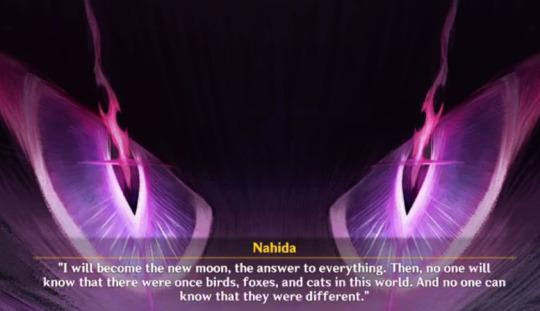
They essentially create an artificial ubermensch capable of redefining values, but the real ubermensch is found behind the artificial god itself.
Crime and punishment
Nietzsche called Fyodor Dostoevsky the only psychologist he had anything to learn from, as he was deeply influenced by the psychology of his novels —of which he read botched translations that didn't quite transmit the author's philosophy, but still.
The novel Crime and Punishment has a protagonist that represents the opposite of the author's beliefs, who happens to be quite similar to Nietzsche's idea of the ubermensch or the higher man. This character justifies his crime (a murder) to himself arguing that people are divided into the ordinary and the extraordinary, and the extraordinary have the right to commit crimes if it allows them to put forward their extraordinary contributions to the world.
From Crime and Punishment:
“Ordinary men have to live in submission and have no right to transgress the law, because, don't you see, they are ordinary. But extraordinary men have a right to commit any crime and transgress the law in any way, just because they are extraordinary.”
“...if the discoveries of Kepler and Newton could not have been made known except by sacrificing the lives of one, a dozen, a hundred, or more men, Newton would have had the right, would indeed have been in duty bound…to eliminate the dozen or the hundred men for the sake of making his discoveries known to the whole of humanity. But it does not follow from that that Newton had a right to murder people left and right to steal every day in the market.”
The protagonist sees himself as an extraordinary man, therefore, his murder is justified in contribution made to the world in exchange.
For Nietzsche, who sees life conditioned on the dominance over the life of others, a criminal is a man whose primordial human impulses to exercise power, which in the ordinary men have been suppressed by the dominating morality, have found an unconventional outlet through crime. Thus, a criminal is a symptom of a sick society that has domesticated itself out of its own nature.
The criminal as a glorified outcast, a rebel against modern society whose abhorrent behavior is a healthy instinct that denotes potential —at least symbolically, he wasn't calling out to people to commit crimes per se.
While Dostoevsky wrote the protagonist of his novel to struggle with guilt in the form of an illness and allowed him to find salvation in facing punishment for his crime, Nietzsche holds the criminal in high regard, seeing guilt as something beneath him.
This archetype is popular in media with characters like Hannibal Lecter, and indeed, many fans of the game expected Alhaitham or Scaramouche to fulfill it, but the character that truly embodies the outcast genius is The Doctor.

Dottore commits crimes against others to carry out his plans, never feeling guilt or shame. He was expelled from the Akademiya precisely for violating the ethical code all scholars are governed by and, as Nietzsche's ubermensch, aims to redefine the values of the world by collaborating with the Tsaritsa to “burn the old world.”
However, Dottore is the antagonist of the chapter, and the attempt at manufacturing the artificial god is depicted as an act of hubris, not a brave crusade against the restraining morality of religion. Furthermore, both the sages and Scaramouche face punishment (in their own way), something Nietzsche would disapprove of in an appropriate higher man.
Looking back on the Akademiya, the scholars seem to suffer under the culture of egoism and competition so well established in the institution.
They're often disoriented in their life, contrasting with the villagers who know themselves and their place in the world.
And the god the sages had dismissed as unworthy is reinstalled as the archon, maintaining the institution as it was while taking down the Akasha, the method of control of the sages.
Nietzsche’s egoism is rejected by the narrative, it raises and it falls in the course of the chapter, but what does this mean for the region?
Part 2 will examine how the narrative engages with the philosophies of altruism and how both egoism and altruism converge in the characters of Alhaitham and Kaveh
23 notes
·
View notes
Text
The Strength of Selfishness
Each character in BSD has a degree of selfishness or selflessness in themselves, but the way this concept is executed opens discussion on the nuance of “selfishness,” or specifically the flaws in believing selfishness is an inherently bad trait.
Atsushi
Atsushi fits the description of selflessness, but I’d argue that he’s actually more selfish than he thinks he is (keeping in mind that being selfish isn’t necessarily a bad thing).
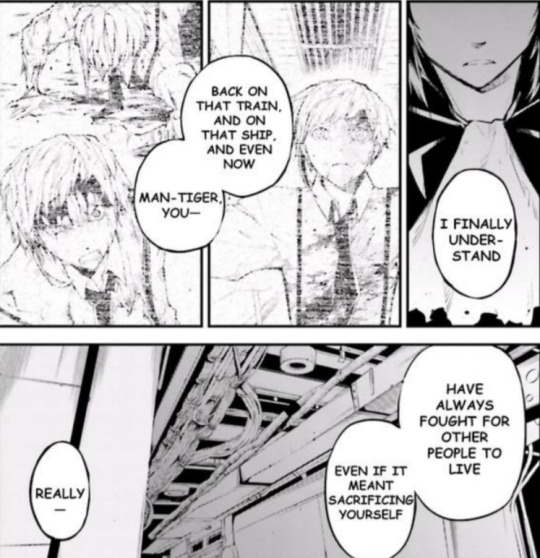
Akutagawa points out how Atsushi will needlessly risk his life in order to protect others, which sounds like a pretty heroic act, but it comes with a cost. Atsushi isn’t invincible, especially at this point in the story when he hasn’t fully mastered his ability, but his insistence on protecting others puts him in constant danger.
At the end of the day, Atsushi would have a greater chance of surviving many of the dangerous situations he puts himself into if he was more selfish by protecting himself before others.
However, Atsushi is also somewhat selfish in his motivations for acting so virtuously.
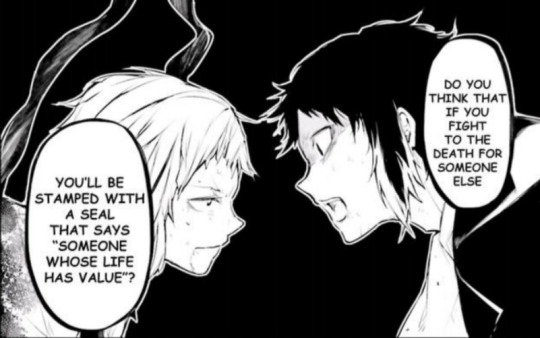
Once again, Akutagawa points out how Atsushi only acts this way because of his deeply rooted belief that he has to risk his life for someone else in order to give his life value. You could argue that Atsushi only saves others as an attempt to prove to himself that he’s worthy, an inherently selfish motive. If Atsushi actually died, he would be endangering the people he could save in the future.
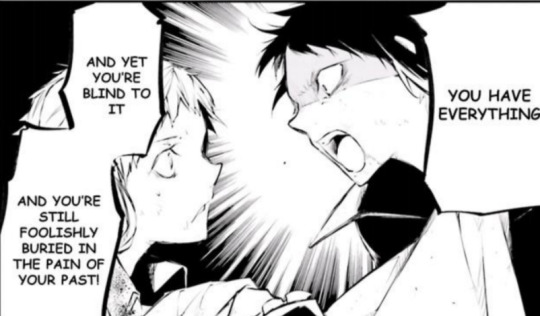
Selfishness also includes self-centeredness. Particularly with Akutagawa, Atsushi’s tendency to focus solely on himself becomes especially noticeable. Atsushi constantly doubts himself and his strengths; he also ignores his privileges and the struggles of others, particularly when he can’t completely understand them — hence why he views Akutagawa so harshly but sees Kyouka and Lucy as people who need to be saved.
Despite all of this, Atsushi still creates a positive impact in other people’s lives. His innately selfish motivation is what drives him to protect others, and he ultimately succeeds in doing that (case in point Kyouka and Lucy again).
Keep reading
307 notes
·
View notes
Text
ratio the dissemination | the learned
ratio being the aeon of dissemination. much, much less a romantic plot and much more of an infodump. someone, anyone, i beg of you, please ask me to elaborate on this further
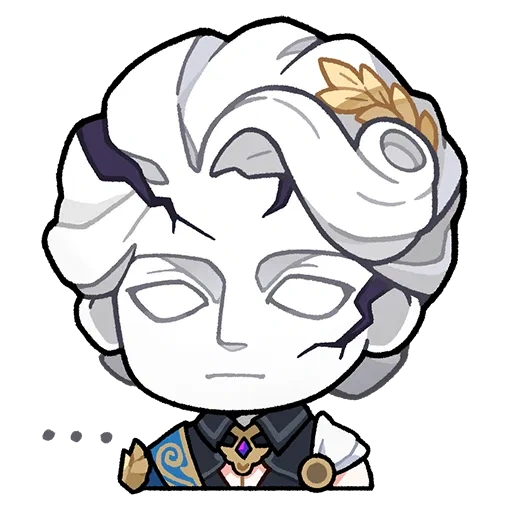
the dissemination was a path open to all who would be willing to listen and learn, and yet only a handful of pathstriders are worthy enough to follow the footsteps of the dissemination directly as emanators. they were an enigmatic being at best, and a silent being at worst, but that did not make them inherently unkind. one would liken their way - his way - of ruling over the path the way rain falls. methodical, constant, ultimately ever present whether one chooses to have an umbrella on hand or not. although their gifts were constant, and their knowledge abundant, they were not known to have any emanators by their side, or at least, not a noteworthy one.
believing fairness above all, ratio the dissemination has forgone giving a single mortal being the ability to draw power from their path. or perhaps, they were just selective to who they gave this blessed curse with, and had not found one that matched their desires to cultivate and spread information around the cosmos. one would have to be intelligent, or at least possess and innate willingness to learn where they lack, and yet hold a deep desire to help humanity. such is not an easy feat by any stretch of the imagination.
geniuses in general were prone to hording their knowledge than to spread it out evenly. as such, the geniuses within nous the erudition's genius society far outweighed the minds of ratio the dissemination's ' the learned ' in sheer numbers alone. but just an uneven scale was not enough to engulf the dissemination's path as a whole. the minds following the dissemination were good, kind people, who often chose to help others learn the right answers to their problems. these beings were intelligent and held humility, something that many within the genius society did not.
several times, the cosmos chose to compare the dissemination to the erudition. after all, they both pertained to knowledge, how could they truly be so different ? but the different stemmed from the recognition of genius from both paths. ratio would cast their gaze to anyone who was willing to learn and to spread their wisdom, whereas nous only looked at those willing to study, to test, and ultimately, to horde.
the difference even lay within the aeon itself. nous was a supercomputer, only able to make calculated predictions within the variables that it knew. having a horde of knowledge meant that their understanding of the cosmos at large was at stake. if they did not know, they could not predict. they could not think. ratio, on the other hand, took on a more animal-like appearance. the body of a large, twisting marble snake, with the large expanse of six owl wings, three on each side. they did not need to horde knowledge, they were able to spread their wings upon anyone who dared to ask " why ? "
at least, this was the appearance that people commonly associated with the dissemination. you, a faithful pathstrider of the dissemination, one of the learned, however, knew of a different appearance.
you had finished giving a particularly harsh lecture one day, your heart wary but your mind racing with ideas. your mind never stopped, it always continued forward, unending. you would ponder everything, and your introspection lead you to the same conclusion every single time you thought about it : there were no downsides to helping further humanity. and so you taught, vehemently, with your everything. lecture after lecture, book after book, you never gave up on your mission.
this day, however, you were tired. wariness had caught up to you, and you were slumped over in your desk, your head in your hands as you tried to focus on grading your student's tests. you really couldn't stop racing towards this goal, and yet your mind unable to reach any fulfilling answers. was this all for nothing ? how likely was it that you could teach everyone ? surely your kindness would be exploited, surely the ipc would get their hands on the dissemination's learned, as they did the erudition's intelligentsia guild ?
was the path of the dissemination even worth following, if all it did was lead you down a never ending spiral ?
" raise your head, " a man's voice jolted you out of your thoughts. you jolted up, surprised, looking up at him with creased eyebrows. your office door was locked. how did he get in ? " you will be fine. "
the man had wavy iridescent purple hair, that almost looked like it could be blue, too, if the light hit it right, and sharp red-gold eyes, taking in your every reaction. his clothes were just a simple blue and white robe over a black vest and blue slacks, and he had a muscular build, towering over you as you sat down. and in his hair, the laurel, a symbol of the dissemination. those who followed the path often wore it, or something similar, to distinguish between their few numbers. was he a member of the learned as well ?
" i- " you started, finding yourself at a loss for words for a moment. " have no idea what you are talking about, my apologies. how- how did you get in ? are you looking for me ? " " looking for you ? yes, i suppose so, " he replied, ignoring your other question, perhaps on purpose. and perhaps it was best that you didn't know, you thought. " please, call me dr. ratio. " " doct- huh ? " confused, you stammered a little bit, unsure what he was getting at. but he didn't take the time to answer any of the questions you may had, his mouth working faster than your brain.
" i would like to teach you, personally, " dr. ratio explained, not being a man of many words, crossing his arms as he looked at you with a discerning eye, his gaze seemingly tearing you apart, revealing your intricacies and stitching you back up together again. " if you will willing to be under my tutelage, of course. "
the dissemination did not have any emanators so far, and he did not have a human appearance, as far as the records went. but you knew. you knew the truth. you knew a different being than ratio the dissemination.
you knew doctor veritas ratio, the scholar with a temper. and you learned under his wings.
307 notes
·
View notes
Text
The "Storm"
"The 'Storm' brings frequent anomalies. And also more development and field missions. Sadly, combat is not my thing; luckily, data analysis is!" - X, Xtreme Talent
The "Storm" is an intriguing topic to look into in the world of Reverse: 1999, and a lot of people tend to be confused on how it works alongside the functions of the immunity zones. For this post, this'll essentially be a more detailed explanation on it. This post will cover what the "Storm" is, its patterns, and the function of the immunity zones with Asymmetrical Nuclide R. This'll be a really long post, so hold tight. :) [Spoilers for Chapter 5-6]
What is the “Storm” anyway?
The “Storm”—or the "Emanation" to the Islanders—is a supernatural phenomena that is affecting most of the globe. It destroys the current era of society and reconstructs it into a point in the past or in the future. It “reverses” time, with the tendency to regress through eras. This means human technology increasingly deteriorates while arcanum flourishes.

Being a phenomena caused by arcanum, the “Storm” is difficult to be studied. Basic understanding of the "Storm" requires affinity with arcanum.
The “Storm” is unpredictable; Besides the Manus and the Apeiron to some degree, no one knows when the “Storm” happens, but the closer we get to its occurrence, the easier it is to figure it out. Manus activity is shown to accelerate the "Storm", with events beginning to deviate from the historic timeline due to their influence.
As of ‘The Star’ and Chapter 6, we find that Laplace has been keeping track of possible “critical points.” Critical points indicate where the eye of the “Storm” might be. An “eye” tends to be located at places globally significant, where historical events take place. It can be a cultural event, a significant movement, or a major conflict. These events don’t have to directly affect the entire world, per se. They merely have to be significant enough to leave a mark in the world's history.

Right now, 8 “Storms” have passed and we have one that is currently beginning to take place. With the information we have of each one, we find common themes among them:
1. Most of these “Storms” occur at least 1 year after the other. There are 4 exceptions to it:
1999 (The Progenitor)
1987 (3 years)
1929 (1 day)
1914 (5 months)
2. They’re triggered when the timeline destabilises, or strays from what is the normal ‘course’ of the world’s timeline. (As said by Greta Hofmann)


3. The nature of the “Storm” and the Storm Syndrome are usually based on the themes of the era and the conflict.
A very clear example of this would be the “Storms” of 1966 and 1929. With 1966, we see how the height of the “Storm” deconstructs everything around the critical point with booming bold colours and pop-like art, reminiscent of the UK’s Swinging Sixties (as mentioned by the game itself).
With 1929, we see how the Storm Syndrome affects the mass population of humans, with how they sell food in exchange for gold and money to eat because of how it references the sudden rise in the American stock market. This led to the Wall Street Crash of 1929, and the crash caused an economic recession in the US.


Important notes about the "Storm"
Now we have to keep in mind that there are some things that need to be noted about this phenomenon. For one, the “Storm” doesn’t induce the grandfather paradox, since the survivors of the phenomenon don’t cease to exist whenever they arrive in an era that precedes their lifetime. They don’t encounter the younger versions of themselves either.
Also, since this is an event caused by arcanum, the people who are mainly affected are humans and mixed people who don't have strong arcanum. Pure-blood arcanists tend to be the ones who are the last to be affected by the "Storm," since they only begin to feel the effects once the countdown is approaches near-zero.
The memories of the survivors are quite faded. For example, none of them could remember what happened during 1999 that caused the first “Storm.” Greta and Vertin themselves confirm that they and the Foundation have rather vague memories of that time for reasons yet to be found.

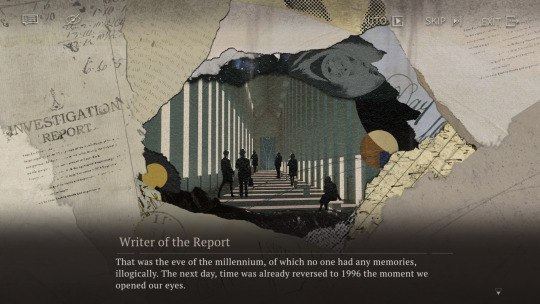
And lastly, as stated before, the “Storm” can be accelerated / triggered early by orchestrating a chain of events that further puts strain on the critical point, and significantly causes disruption in the original timeline. This is the case with 1929 and 1914 right now.
Immunity Zones, Asymmetrical Nuclide R, and Vertin
With these out of the way, there is now space to talk about the points of immunity. For a location to be immune, the area would need a “core” that distributes a high concentration of Asymmetrical Nuclide R.
AN-R is a nuclide that’s present in the “Storm's" rainwater, as well as the fog in Apeiron, the Spinning Wheel, and possibly the Yuān temple in Pei City alongside Uluru in Australia. The nuclide creates a structure that makes it possible to survive the “Storm,” but it is an unstable component that can quickly disappear when isolated from the rain drops.
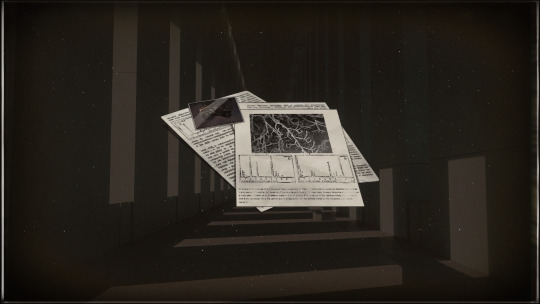
A more stabilised structure of these nuclides are those found imbued in the Manus Vindictae Mask, and the fog surrounding the cores of the immunity zones. However, when one comes close to said fog, it can affect people’s minds to the point of deep sleep until they’re taken out of the area. Otherwise, time flows normally within the immunity zones, unaffected by the “Storm.”
Meanwhile, as the truth remains unknown (noting that Asymmetrical Protein G is a false biomolecule), Vertin is the only person who is able to cross the “Storm” unharmed. She is able to endure most of its effects such as the fog.
For example: In the fog surrounding the Apeiron and the caves of the Island, she wasn’t afflicted with the deep sleep most of the time until she was fully immersed in it. However, she only needed to be woken up by any sort of disturbance. (i.e. pain caused by the bangle)
Despite this however, she’s unable to perceive and predict the “Storm," needing technology from Laplace to keep track of its countdown.

Anyway, AN-R tends to spread throughout an entire area and creates a range of immunity from the “Storm.” This range becomes theoretically weaker as one strays further from the main source; it's why Vertin’s breakaway group got reversed as they played outside the tower, while Madam Z survived while being barely outside the building. (Chapter 3)
It may also explain why the humans did not survive being in Vertin’s suitcase, since the spinning wheel might not be a strong enough core for the nuclide to resonate really well with humans. But I’m not exactly sure why this is, so this is only an assumption for myself.
For now, this is all the information that I have of the "Storm" and the immunity zones. There are some pieces of information that I also found while looking into it, but I've kept these as footnotes for now to go back to later once things begin to come together.
Many ideas can be thought of on how the phenomenon could affect many other areas, but this is essentially how it works based on what was observed in the story. I hope it answers a lot of questions for some who don't quite understand the "Storm." And if there aren't, feel free to ask me anything. Thanks for reaching the end. :)
117 notes
·
View notes
Note
thoughts on renheng? answer honestly! there’s no wrong opinion tbh
Okay, so I'm not familiar with the characters, so this is an opinion from an outsider's point of view. I'll be honest, I had to search up the ship, like what characters are in there. I vaguely knew who it was about but, generally, trusting my memory is a pretty big gamble so I had to make sure.
At first, I was like "why would anyone ship this? (Aside from the characters being attractive)". But the more I thought about it the more I was like "oh, yeah I see it".
From my understanding, Dan Heng has a lot of resentment that is never touched upon, specifically resentment for Dan Feng. Because of Dan Feng's actions, Heng was forced to grow up in a prison (I think), he's not perceived as his own person but rather as Feng. I imagine it must be very annoying and disheartening to keep reminding people that you are you, and not someone else. To top it all of, there's this crazy guy who keeps trying to kill you because he doesn't care that you keep telling him that you are not your past version but your own person, with your own feelings, experiences, memories and beliefs.
On the other side, we have Blade. This man is in constant pain to the point that he needs literal mind control to be somewhat stable. And he keeps holding a dead guy responsible over this even though he had agreed to help in Feng's "experiments". The loving guy, Yingxing, doesn't exist anymore, as he said: it's a deadname now. Only the ugly deformed resentment in the form of Blade exists now. And because he can't kill himself, he hunts down Heng, refusing to acknowledge Heng's identity and how it's separate from Feng's. And all of that, because aside from that he has nothing. He is clinging to his past in the most destructive way possible, instead of finding another, healthier, solution.
Realistically, I don't think it has any chance of working. Or, if it somehow does happen, it would not be pretty. Heng is terrified of Blade, and I don't think Blade could ever get over everything that happened all those centuries (?) ago. It can explore some interesting themes, like rage and resentment filled grief while being surrounded by reminders of the person you're grieving and how forge your own identity when everyone sees you as someone they knew years ago.
So, in conclusion, it's nice, but not for me.
16 notes
·
View notes
Text
renheng is arguably too delicious for the average hoyoverse fan because when i found out one of the main characters is haunted by a spectre of his past who hates him so much entirely because he once loved and trusted him. and they watched the stars together. and they have matching bracers that they can sense each other through. and they were closer than any other two in their old friend group. and
132 notes
·
View notes